




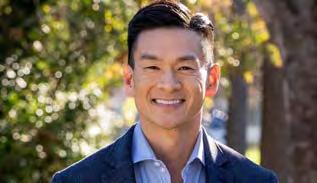
Low stuck in 3rd place for House seat
by Matthew S. Bajko
Gay Assemblymember Evan Low (D-Cupertino) is trailing in his bid to become the first LGBTQ member of Congress from the Bay Area. He was one of 11 candidates on Tuesday’s primary ballot vying to succeed Congressmember Anna Eshoo (D-Palo Alto).
Eshoo will retire later this year from the South Bay House seat she has held since 1993. Her 16th Congressional District spans San Mateo and Santa Clara counties.
Low is currently in third place with 16% of the vote, with only the top two finishers advancing to the November ballot. The current first-place finisher is former San Jose mayor Sam Liccardo, a Democrat, with 23% of the vote, while Democratic Santa Clara County Supervisor Joe Simitian is holding on to second place with 19%.
In a post on X late Tuesday night Low expressed hope in being able to secure one of the top spots as more ballots are tabulated.
“With numerous votes outstanding, the election remains too close to call,” wrote Low. “I look forward to reviewing the results of the remaining votes as they come in and remain hopeful we will continue to the General Election.”
The race, seen as a prime opportunity to elect the first LGBTQ congressmember from Northern California, had also drawn bisexual Palo Alto City Councilmember Julie Lythcott-Haims. But based on the early returns, she was trailing in eighth place with 5% of the vote.
In the East Bay race to succeed outgoing Congresswoman Barbara Lee (D-Oakland), who failed to survive Tuesday’s primary race for a U.S. Senate seat, queer candidate Jennifer Kim-Anh Tran, Ph.D., is currently in second place with nearly 18%, according to the unofficial returns.
As expected, Democratic BART board member Lateefah Simon took a commanding lead in the race for the District 12 House seat with close to 43% of the vote count so far. Simon went into Tuesday’s primary with strong support within her party.
Lagging in third place is business owner Tim Sanchez, a U.S. Navy Reserves veteran who served in Afghanistan. He currently has almost 16% of the vote.
In San Francisco, transgender candidate Bianca Von Krieg failed to survive the primary contest for the city’s District 11 House seat, landing in fifth place with 3% of the vote. Incumbent Democratic Congressmember Nancy Pelosi easily finished in first place with nearly 74% of the early vote, while Republican Bruce Lou was in second with nearly 9%.
Southern California House races
The Golden State’s current two gay House members, Democratic Congressmen Mark Takano of Riverside and Robert Garcia of Long Beach, easily took first place in their contests Tuesday as they seek reelection this November.
Takano was leading his Republican opponent, David Serpa, with 60% of the vote to maintain his District 39 House seat. Defending his District 42 seat against one Republican and two Democrats, Garcia was in first place with roughly 56% of the vote based on the early returns while GOPer John Briscoe was at 31%.
Primary narrows field of LGBTQ CA legislative candidates
by Matthew S. Bajko
Ahistoric 30 LGBTQ candidates sought California legislative seats on Tuesday’s ballot, with a record eight identifying as part of the bisexual community. While the vote count is expected to last days due to mailed in ballots, what is certain is that the primary race outcomes will narrow the field of out contenders advancing on to the fall election.
Several of the contests featured multiple LGBTQ candidates, and only the top two-vote getters will compete on the November 5 ballot. Twelve of them were women, another record for out candidates based on election statistics kept by the Bay Area Reporter, and two were transgender.
Due to a trio of out incumbents departing this year, predictions ahead of Tuesday’s primary had the number of LGBTQ legislators in Sacramento growing from the current high of 12 to being 15 or more come the fall. It now looks like the caucus has a chance to grow to perhaps as many as 16 members come December when the winners of the fall contests will be sworn into office.
In the Bay Area, the most heated race with LGBTQ contenders was the battle for the East Bay’s open Senate District 7 seat that spans Alameda and Contra Costa counties. AC Transit board member Jovanka Beckles and union leader Kathryn Lybarger, who both identify as queer and lesbian, were among the six people running to succeed termed out Senator Nancy Skinner (D-Berkeley).

Buoyed by labor donations that helped her blanket local airwaves with a TV ad that featured her playing guitar, Lybarger was expected to easily strum her way into one of the top spots. Yet she was fighting for fourth place along with Republican Jeanne Solnordal as of early Wednesday.
They both had 13% of the vote, with Lybarger’s total of 7,564 votes one more than that of Solnordal. They both had 13% of the vote, with Lybarger’s
total of 7,564 votes one more than that of Solnordal. Beckles was in third place with 14% of the vote.
As expected Berkeley Mayor Jesse Arreguín was in first place with 31% of the vote. Poised to compete against him in November is Oakland City Councilmember Dan Kalb if he maintains his second place finish, having netted 17% of the vote so far.
See page 10 >>
Sitting SF judges are winning in race that became safety referendum
by John Ferrannini
Two attorneys challenging sitting San Francisco judges are falling short in their bid against the current gavel-holders who they argued are soft on crime.
According to preliminary election returns from the San Francisco Department of Elections, Judge Patrick Thompson is leading San Francisco Assistant District Attorney Jean Myungjin Roland, 53.3%-46.6%. Judge Michael Isaku Begert is ahead of attorney Chip Zecher, a gay man, 59.5%-40.9%.
At an election night party in the Mission, Begert said the race gave him the opportunity to see if he’d stay true to his values.
“We can talk about the values we have but we don’t always have the ability to test them for ourselves, and this has allowed me that opportunity,” Begert said.
Begert said the race also allowed him the chance to test how hard he’d work.
“The answer is pretty fucking hard,” he said.
Speaking at the same event, Thompson thanked former mayor Willie Brown for a piece of advice given over a coffee meeting between the two of them and Board of Supervisors President Aaron Peskin.
“‘You are a judge. Remain a judge, don’t become a politician,’” Thompson recalled Brown saying. “He affirmed the value we hold for our courts.”
Thompson also thanked Peskin, who criticized the challenges last fall during a news conference on the steps of City Hall. At that time Peskin said of the challengers that “it is misplaced, it is dangerous, and we cannot allow it to happen in San Francisco.”
Peskin told the Bay Area Reporter on election night that he was “heartened that San Francisco voters roundly repudiated the right-wing billionaire funded efforts to compromise the indepen-

dence of our judiciary and politicize our courts.”
Thompson told the B.A.R. on the morning of March 6 that he’s proud of the “by-the-book” campaign he ran.
“During my race, I campaigned as a by-thebook judge who respects the law and everyone who comes to court,” he stated. “I am overwhelmed by the support I have received from the LGBTQ+ community for a message rooted in impartial and fair courts guided by law, not politics. I hope the preliminary results in my favor carry the win so I can continue to serve this beautiful community.”
Roland and Zecher did not return requests for comment.
Thompson was appointed to the bench two years ago by Governor Gavin Newsom (D) and Begert was appointed by Republican former Governor Arnold Schwarzenegger. Begert is
supervising judge of the Community Assistance, Recovery and Empowerment, or CARE, courts established by Newsom. The goal of the program is to get people in crisis off the streets. According to a fact sheet from Newsom’s office, CARE court connects a person struggling with untreated mental illness – and often also substance use challenges – with a court-ordered Care Plan for up to 24 months.
Zecher was appointed by Newsom to the board of directors of UC Law San Francisco (formerly Hastings) in 2019 and is its vice chair. Roland has been with the DA’s office for decades, and was involved in a moment of controversy during the campaign because she did not report the drug use of her husband, who was also her co-worker at the office, to her superiors back in 2002, as the San Francisco Standard reported in January. t
Serving the lesbian, gay, bisexual, transgender, and queer communities since 1971 www.ebar.com Vol. 54 • No. 10 • March 7-13, 2024 John Bankston ARTS 13 13 ARTS Changes for SF DCCC 08 04 The US Senate race set ‘Falsettos’
See page 10 >>
Assemblymember Evan Low is in third place in his bid for a congressional seat.
Courtesy the candidate
State Senate candidate Lisa Middleton was in first place in her Southern California race, while Bay Area state Senate candidates Jovanka Beckles and Kathryn Lybarger were falling short in their Bay Area race.
Courtesy the candidates
San Francisco Superior Court Judge Michael Isaku Begert spoke to supporters at an election night party Tuesday. Behind him is Judge Patrick Thompson.
John Ferrannini

IMPORTANT FACTS FOR BIKTARVY®
This is only a brief summary of important information about BIKTARVY® and does not replace talking to your healthcare provider about your condition and your treatment. (bik-TAR-vee)
MOST IMPORTANT INFORMATION ABOUT BIKTARVY
BIKTARVY may cause serious side e ects, including:
Worsening of hepatitis B (HBV) infection. Your healthcare provider will test you for HBV. If you have both HIV-1 and HBV, your HBV may suddenly get worse if you stop taking BIKTARVY. Do not stop taking BIKTARVY without first talking to your healthcare provider, as they will need to check your health regularly for several months, and may give you HBV medicine.
ABOUT BIKTARVY
BIKTARVY is a complete, 1-pill, once-a-day prescription medicine used to treat HIV-1 in adults and children who weigh at least 55 pounds. It can either be used in people who have never taken HIV-1 medicines before, or people who are replacing their current HIV-1 medicines and whose healthcare provider determines they meet certain requirements.
BIKTARVY does not cure HIV-1 or AIDS. HIV-1 is the virus that causes AIDS.
Do NOT take BIKTARVY if you also take a medicine that contains:
dofetilide
rifampin
any other medicines to treat HIV-1
BEFORE TAKING BIKTARVY
Tell your healthcare provider if you:
Have or have had any kidney or liver problems, including hepatitis infection.
Have any other health problems.
Are pregnant or plan to become pregnant. It is not known if BIKTARVY can harm your unborn baby. Tell your healthcare provider if you become pregnant while taking BIKTARVY.
Are breastfeeding (nursing) or plan to breastfeed. Do not breastfeed. HIV-1 can be passed to the baby in breast milk.
Tell your healthcare provider about all the medicines you take:
Keep a list that includes all prescription and over-thecounter medicines, antacids, laxatives, vitamins, and herbal supplements, and show it to your healthcare provider and pharmacist.
BIKTARVY and other medicines may a ect each other. Ask your healthcare provider and pharmacist about medicines that interact with BIKTARVY, and ask if it is safe to take BIKTARVY with all your other medicines.









POSSIBLE SIDE EFFECTS OF BIKTARVY
BIKTARVY may cause serious side e ects, including:
Those in the “Most Important Information About BIKTARVY” section.
Changes in your immune system. Your immune system may get stronger and begin to fight infections that may have been hidden in your body. Tell your healthcare provider if you have any new symptoms after you start taking BIKTARVY.
Kidney problems, including kidney failure. Your healthcare provider should do blood and urine tests to check your kidneys. If you develop new or worse kidney problems, they may tell you to stop taking BIKTARVY.
Too much lactic acid in your blood (lactic acidosis), which is a serious but rare medical emergency that can lead to death. Tell your healthcare provider right away if you get these symptoms: weakness or being more tired than usual, unusual muscle pain, being short of breath or fast breathing, stomach pain with nausea and vomiting, cold or blue hands and feet, feel dizzy or lightheaded, or a fast or abnormal heartbeat.
Severe liver problems, which in rare cases can lead to death. Tell your healthcare provider right away if you get these symptoms: skin or the white part of your eyes turns yellow, dark “tea-colored” urine, lightcolored stools, loss of appetite for several days or longer, nausea, or stomach-area pain.
The most common side e ects of BIKTARVY in clinical studies were diarrhea (6%), nausea (6%), and headache (5%).
These are not all the possible side e ects of BIKTARVY. Tell your healthcare provider right away if you have any new symptoms while taking BIKTARVY.
You are encouraged to report negative side e ects of prescription drugs to the FDA. Visit www.FDA.gov/ medwatch or call 1-800-FDA-1088.
Your healthcare provider will need to do tests to monitor your health before and during treatment with BIKTARVY.
HOW TO TAKE BIKTARVY
Take BIKTARVY 1 time each day with or without food.
GET MORE INFORMATION
This is only a brief summary of important information about BIKTARVY. Talk to your healthcare provider or pharmacist to learn more.
Go to BIKTARVY.com or call 1-800-GILEAD-5.
If you need help paying for your medicine, visit BIKTARVY.com for program information.










US_BVYC_0293_BIKTARVY_D_9-75x16_BayAreaReporter_r1v1jl.indd All Pages 21379-Biktarvy-030724.indd 1
BIKTARVY, the BIKTARVY Logo, GILEAD, the GILEAD Logo, and KEEP BEING YOU are trademarks of Gilead Sciences, Inc., or its related companies. © 2023 Gilead Sciences, Inc. All rights reserved. US-BVYC-0293 04/23













































No






BIKTARVY® is a complete, 1-pill, once-a-day prescription medicine used to treat HIV-1 in certain adults. BIKTARVY does not cure HIV-1 or AIDS.
Ask your healthcare provider if BIKTARVY is right for you.
Person featured takes BIKTARVY and is compensated by Gilead.























Please see Important Facts about BIKTARVY, including important warnings, on the previous page and at BIKTARVY.com.







and to
SWITCHED
BIKTARVY Listen to REAL STORIES being told by REAL VOICES. IQVIA NPA Weekly, 04/19/2019 through 01/20/2023. #1 PRESCRIBED HIV TREATMENT* 5/9/23 12:24 PM2/29/24 7:42 AM
matter where life takes you, Because HIV doesn’t change who you are. ELIAS
TO
Schiff, Garvey advance in CA US Senate race
by Cynthia Laird
Congressmember Adam Schiff and retired baseball star Steve Garvey advanced to the November general election in the race for a California U.S. Senate seat.
Schiff, a Democrat from Burbank, will take on Garvey, a Republican, after he spent millions of dollars in TV ads to elevate the former Los Angeles Dodgers and San Diego Padres first baseman, who did not spend much time campaigning or elaborating policy positions. With California a solid blue state, Schiff immediately becomes the favorite to replace the late senator Dianne Feinstein in the Senate. California hasn’t elected a Republican to statewide office since 2006.
Schiff’s campaign decision to promote Garvey knocked out Congressmember Katie Porter (D-Irvine), who finished third and was positioned to be a more formidable candidate in November should she have taken second place. Porter will leave office in January.
Under the state’s open primary, the
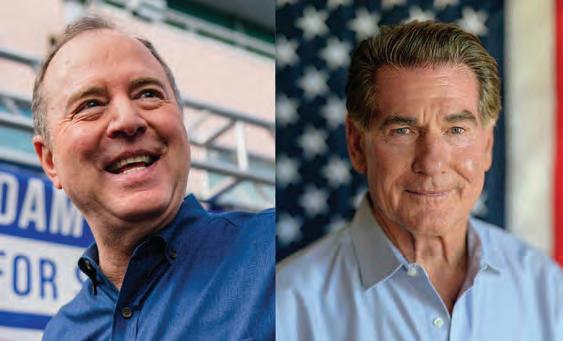
top two finishers regardless of party advance to the general election.
Congressmember Barbara Lee (D-Oakland), a longtime progressive champion, saw her elected political career come to an end Tuesday; she will also leave office in January. Lee had not raised much money in the Senate contest – she had few TV com-
mercials – and consistently polled in the high single digits, well behind the other major candidates.
Following Feinstein’s death last September, Governor Gavin Newsom appointed Laphonza Butler (D), a Black lesbian, to fill the seat. Butler subsequently decided not to seek election, meaning her time in office will end in
November after the vote is certified. Californians voted twice in the Senate contest Tuesday, once to fill the unexpired term of Feinstein, and once for a full six-year term. Voters will do so again in November.
Preliminary results from the California Secretary of State’s office for the partial term had Garvey in first place with 34.6% of the vote, followed by Schiff with 30.8%. Porter was in third with 16%, followed by Lee at 9.3%. The top two move on to the fall ballot.
For the full term, unofficial results showed Schiff in first place with 33.2% of the vote, followed by Garvey at 32.4%. Porter garnered 13.8% of the vote and Lee trailed with 7.4%.
Other minor candidates rounded out the vote in both races.
Schiff wrote on X, “Thank you, California.”
Lee conceded Wednesday.
“I want to thank all of my supporters and all of the volunteers who made calls, knocked doors, and did amazing work on the ground to reach communities across the state,” Lee stated. “Our voices and values were heard
loud and clear: Californians deserve a living wage, an economy that works for everyone, housing and healthcare as human rights, racial and economic equity, public safety for all communities and just climate action.
“I congratulate my colleague, Rep. Adam Schiff on his victory in advancing in this race,” Lee added.
Porter thanked her supporters in a message on X prior to the polls closing. In the final days of the campaign, she acknowledged in last minute fundraising appeals that she likely would fall short, as polls had her in third place behind Garvey and Schiff.
In Palm Desert, Garvey spoke at his election night party. The Los Angeles Times reported that he thanked supporters and used a baseball analogy about finishing in the top two.
“Welcome to the California comeback,” Garvey told the crowd.
“What you are all feeling tonight is what it’s like to hit a walk-off home run. ... Keep in mind, this is the first game of a doubleheader. So keep the evening of November 5 open, as we’ll celebrate again.” t
SF voters back safety, bond measures
by John Ferrannini
San Francisco voters appeared to give greater powers to law enforcement, restrict public benefits for drug users, and defeated a measure that would have tied hiring more police to tax revenue, according to preliminary election returns.
Proposition E, supported by Mayor London Breed and moderate supervisors, would curtail the power of the police commission over the department, allow the department to hold community meetings before the commission can change policies, and authorize the depart-
ment to use drones and install surveillance cameras without further approval. Proponents argued it will help the city better address public safety challenges.
Opponents, such as the American Civil Liberties Union of Northern California, had countered that the measure guts reforms meant to hold police accountable and will disproportionately impact people of color. Voters seemed to agree with Breed, supporting the measure 59.9%-40.1%, according to preliminary election returns from the San Francisco Department of Elections.
In a statement, Breed stated she’d
work with the San Francisco Police Department to quickly implement Prop E.
“By supporting the work of our police officers, expanding our use of technology, and getting officers out from behind their desks and onto our streets, we will continue in our mission to make San Francisco a safer city,” Breed stated.
One of Breed’s opponents in the upcoming mayoral battle, Levi Strauss heir Daniel Lurie, stated that the likely passage of Prop E shows voters want solutions to the city’s public safety issues.
“City Hall’s inaction and misplaced priorities have left San Francisco’s law en-

- Brian H., resident
forcement agencies facing a staffing crisis,” Lurie stated. “The voters spoke clearly in passing Prop E to use community safety cameras and other common sense technology to apprehend and hold repeat offenders accountable – tactics that should have been employed years ago.”
Former mayor Mark Farrell and District 11 Supervisor Ahsha Safaí, who are also running for mayor, did not return requests for comment.
Proposition F, also supported by Breed, requires single adults 65 years of age and younger with no dependent children who receive public assistance and who the city suspects are dependent on illegal drugs to participate in drug screening, evaluation, and treatment to remain eligible for city benefits. The measure is winning 63%-37%, according to preliminary election returns.
Breed stated that the proposition will help “get people into treatment and to create more accountability around our city programs.”
“We are also sending a message that we are a city that offers help but not a city where you can just come and do whatever you want on our streets,” she stated. “The passage of Prop F shows that the voters believe we must be both a city of compassion and accountability.”
Proposition B was put on the ballot through a 6-5 vote of the Board of Supervisors late last year. Safaí argued that the measure is necessary because while he supports ending the understaffing of the police department, he believes voters should decide which tax revenues to “modify, repurpose or create” to cover the cost of the hundreds of new officers needed to bring SFPD back to full staffing, he stated in the voter information pamphlet.
Gay District 6 Supervisor Matt Dorsey originally wanted to deal with the staffing crisis but without mandating voters pass a tax in the future. He disavowed the measure, which he called a “cop tax scheme.”
Voters seem to agree with Dorsey, opposing the measure 67%-33%, according to unofficial returns.
During an election night party at Anina in Hayes Valley – which also celebrated Dorsey and his slate winning big for the San Francisco Democratic County Central Committee – the South of Market supervisor was pleased with the early returns.
“Stop playing games on public safety,” he intoned. “We need to hire police, get to a fully-staffed police department. Voters spoke. We are in the midst of a voter revolt on public safety and voters are still speaking.”
Proposition A was put on the ballot by a unanimous vote of the Board of Supervisors to construct, develop, acquire, or rehabilitate affordable housing through $300 million in general obligation bonds.
It needed 66.66% to pass, and unofficial returns showed it ahead 67.7%32.2%.
Board of Supervisors President Aaron Peskin stated to the B.A.R. on election night, after mentioning what looks like the victory of two incumbent judges he supported, that “I am equally pleased that over 2/3rds of voters saw fit to pass the affordable housing bond that will provide thousands with affordable homes. It is a testament to what we can do when we unite and put good public policy ahead of politics and press releases.”
Breed backed Proposition C that would exempt from the real estate transfer tax a property being converted from commercial to residential use for the first time. The mayor argued it will help the city’s beleaguered downtown economy recover. Opponents, such as the Harvey Milk LGBTQ Democratic Club, argued in the voter information pamphlet that it’s a “billionaire tax break for luxury housing.” Voters seem to agree with Breed,
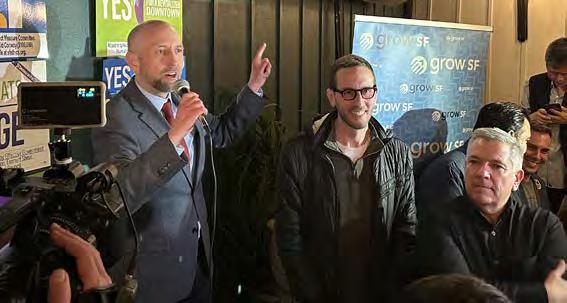

4 • Bay area reporter • March 7-13, 2024 t
<< Election 2024
Spring Lake Village Santa Rosa, CA 707.579.6964 springlakevillage-sr.org CA LIC. #490107656 COA#352 St. Paul’s Towers Oakland, CA 510.891.8542 stpaulstowers.org CA LIC. #011400627 COA#351 San Francisco Towers San Francisco, CA 415.447.5527 sanfranciscotowers.org CA LIC. #380540292 COA#350 Independent Living • Assisted Living • Memory Care • Skilled Nursing “We now live in a community that offers a unique place where we feel welcome, can be ourselves, live among friends and experience new adventures, with the peace of mind for our future.”
Democratic Congressmember Adam Schiff, left, will face Republican retired baseball star Steve Garvey in November in the race for a U.S. Senate seat.
Courtesy the campaigns
Supervisor Joel Engardio was pleased that the nonbinding Proposition G about offering algebra I to eighth graders was passing.
John Ferrannini
See page 5 >>
Out supe candidates await final ballot counts
by Matthew S. Bajko
Running in elections across Califor-
nia Tuesday were eight LGBTQ supervisor candidates aiming to be the first out members on their county boards. Several are now in a wait-and-see mode as their county election offices count the remaining ballots to determine what their electoral fates will be.
The lone out supervisorial candidate who entered the March 5 primary assured of victory was lesbian Tulare County Supervisor Amy Shuklian of Visalia. As no one filed to run against her, she cakewalked into a third term as her board’s District 3 supervisor, having first been elected in 2016.
In the Bay Area, gay candidates Jennifer Esteen and John Bauters ran to be the first LGBTQ supervisors in Alameda County. According to the latest returns, both were in second place in their respective races.
For Esteen, a nurse who lost a bid for state Assembly two years ago, such a showing won’t be enough to oust District 4 Supervisor Nate Miley from the office he first won in 2000. With roughly 37% of the vote, Esteen was trailing far behind the incumbent Tuesday night.
Miley, the current board president, was in a commanding first place with 63% of the vote. With just the two candidates on the ballot, the top vote-getter from Tuesday’s race will be declared the winner of the seat.
In the race for the East Bay board’s District 5 seat, being vacated this year by Supervisor Keith Carson, Bauters
SF voters
From page 4
supporting the measure 53.8%-46.1%, according to preliminary returns.
Proposition D would tighten the city’s ethics laws in the aftermath of the Mohammed Nuru scandal. The former
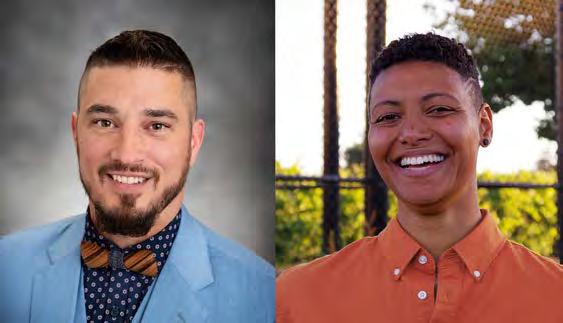
was in second place with 19% of the vote according to the early returns. The Emeryville city councilmember was one of nine people seeking to succeed Carson.
Due to the crowded field, none were expected to receive more than 50% of the vote Tuesday to clinch the contest. Thus, the top two finishers will compete on the November 5 ballot.
Currently in first place in the race is Oakland City Councilmember Nikki Fortunato Bas, who had 28% of the early vote count. And in third place was Berkeley City Councilmember Ben Bartlett with nearly 18% of the vote.
In the North Bay’s Solano County gay former Vallejo city councilmember Michael Wilson was in first place with 51% of the vote in the race for the open District 1 Supervisor seat. He is seeking to succeed his boss, District 1 Supervisor
head of San Francisco Public Works is currently in prison after pleading guilty to wire fraud. Almost two-dozen city employees, contractors, consultants, and permit expediters have been implicated in the scandal. Voters appear to feel new ethics rules are needed, and the measure is succeeding 88%-12%, unof-
Erin Hannigan, as the first LGBTQ person on the countywide governing body.
Hannigan had endorsed Wilson in the race. His only opponent, Vallejo Housing and Community Development Commission Vice Chair Cassandra James, was trailing him by 232 votes.
Seeking to become the first LGBTQ person elected to the Santa Cruz County Board of Supervisors is Monica Martinez. She sought the District 5 seat being vacated by Supervisor Bruce McPherson, who endorsed Martinez in December.
The nonprofit executive and queer mom, who grew up in Bakersfield, would also be the first woman to serve on the countywide body since 2012. She would also be the first woman elected to the District 5 seat, which includes the San Lorenzo Valley and its communities
ficial returns showed. Proposition G would make it city policy to encourage the San Francisco Unified School District to offer algebra by the eighth grade. The district currently offers algebra in the ninth grade, though the school board recently announced algebra I would be offered to eighth grad-
of Ben Lomond, Boulder Creek, and Felton, where Martinez resides.
Based on the early vote count Martinez was in first place but falling short of the 50% plus one vote threshold to win the seat outright and avoid a fall runoff race. As of the latest count she was at 47%.
Currently in second place with nearly 20% of the vote is Christopher Bradford, followed by builder Tom Decker at nearly 19%. Theresa Bond, an advocate on local water issues like Bradford, was in fourth place with 13%.
In the Central Valley, Fresno Economic Opportunities Commission LGBTQ+ resource manager Jennifer Cruz is coming up short in her bid to oust from office Fresno County Supervisor Nathan Magsig. The Republican voted last year to create a board tasked with reviewing books in the county’s library following complaints about LGBTQ titles it had displayed during Pride Month. Cruz, the mother of two children, is in second place with 30% of the vote. Magsig easily took first place with 70% based on the early returns.
In the race for the District 4 seat on the Kern County Board of Supervisors, gay Wasco Mayor Alex Garcia’s goal Tuesday was to be one of the two candidates advancing to the fall ballot since no candidate was expected to surpass the 50% threshold to win outright. Based on the early returns, he is so far in third place with nearly 16% of the vote.
In first place is incumbent Supervisor David Couch, first elected in 2012, with almost 54% of the vote. Delano City
ers. The nonbinding proposition was winning 84%-16%.
Gay District 4 Supervisor Joel Engardio, who sponsored the measure, was excited about that at the aforementioned Anina party, getting cheers when he said “let’s hear it for algebra!”
Councilmembers Salvador SolorioRuiz and Veronica Cruz Vasquez were in second and fourth place, respectively, with nearly 18% and 13%.
In Southern California Gay Skyforest resident Graham Smith also appears to have fallen short in his bid to be the first gay supervisor in San Bernardino County. One of several candidates running against District 3 Supervisor Dawn Rowe, Smith is currently in third place with 11% of the vote.
Rowe was leading in first place with roughly 59% of the vote, enough to avoid a runoff race in November.
Shuklian is among the eight known LGBTQ county supervisors in California. District 3 San Diego County Supervisor Terra Lawson-Remer, a Democrat who is nonbinary and pansexual, is fending off a challenge from Republican former San Diego mayor Kevin Faulconer on the fall ballot. (Because they were the only ones to file, there was no need to hold a primary race Tuesday to determine the two candidates moving on to November.)
The other six are all gay men, none of whom are on the ballot this year. Martin Huberty serves in Calaveras County; Ken Carlson in Contra Costa County; Yxstian Gutierrez in Riverside County; and Rafael Mandelman, Matt Dorsey, and Joel Engardio all serve in San Francisco County. t
Editor’s note: This story will be updated online as new vote totals are released.
sition 1, to authorize $6.38 billion in bonds for mental health treatment for people with substance abuse challenges. It was boosted by Governor Gavin Newsom (D), and is narrowly leading 50.5%49.5%. t
Metro Maintenance Closure

March 8 through
Friday, March 15
During Fix It! Week, Muni Metro subway between Embarcadero and West Portal will close at 9:30 p.m.
Buses will provide service to all Muni Metro stops from 9:30 p.m. to 12 a.m. during this maintenance period. will provide its regular service from Sunnydale to Chinatown-Rose Pak Station until 12 a.m.
Owl service will remain unchanged.
March 7-13, 2024 • Bay area reporter • 5 t Muni Metro to Close Early SFMTA.com/SubwayMaintenance Alert 311 Free language assistance / 免費語言協助 / Ayuda gratis con el idioma / Бесплатная помощь переводчиков / Trợ giúp Thông dịch Miễn phí / Assistance linguistique gratuite / 無料の言語支援 / Libreng tulong para sa wikang Filipino / 무 료 언어 지원 / การช่วยเหลือทางด้านภาษาโดยไม่เสียค่าใช้จ่าย / قمرلا لىع نياجلما ةدعاسلما طخ Friday,
Election 2024>>
Alameda County supervisor candidates John Bauters, left, and Jennifer Esteen
Courtesy the candidates
The one state proposition was Propo<<
Volume 54, Number 10
March 7-13, 2024 www.ebar.com
PUBLISHER
Michael M. Yamashita
Thomas E. Horn, Publisher Emeritus (2013)
Publisher (2003 – 2013)
Bob Ross, Founder (1971 – 2003)
NEWS EDITOR
Cynthia Laird
ARTS & NIGHTLIFE EDITOR
Jim Provenzano
ASSISTANT EDITORS
Matthew S. Bajko • John Ferrannini
CONTRIBUTING WRITERS
Christopher J. Beale • Robert Brokl
Brian Bromberger • Victoria A. Brownworth Philip
Campbell • Heather Cassell
Michael Flanagan •Jim Gladstone
Liz Highleyman • Brandon Judell • Lisa Keen
Philip Mayard • Laura Moreno
David-Elijah Nahmod • J.L. Odom • Paul Parish
Tim Pfaff • Jim Piechota • Adam Sandel
Jason Serinus • Gregg Shapiro
Gwendolyn Smith • Charlie Wagner
Ed Walsh • Cornelius Washington • Sura Wood
ART DIRECTION
Max Leger
PRODUCTION/DESIGN
Ernesto Sopprani
PHOTOGRAPHERS
Jane Philomen Cleland
Rick Gerharter • Gooch
Jose A. Guzman-Colon • Rudy K. Lawidjaja
Georg Lester • Rich Stadtmiller
Christopher Robledo • Fred Rowe
Shot in the City • Steven Underhill • Bill Wilson
ILLUSTRATORS & CARTOONISTS
Christine Smith
VICE PRESIDENT OF ADVERTISING
Scott Wazlowski – 415.829.8937
NATIONAL ADVERTISING REPRESENTATIVE
Rivendell Media – 212.242.6863
LEGAL COUNSEL
Paul H. Melbostad, Esq.


Bay
A division of BAR Media, Inc. © 2024
President: Michael M. Yamashita
Director: Scott Wazlowski
News Editor • news@ebar.com
Arts Editor • arts@ebar.com
Out & About listings • jim@ebar.com
Advertising • scott@ebar.com
Letters
Published
Feds should declassify cannabis for research
Earlier this year, it was reported that newly disclosed documents reveal that federal scientists recommend easing restrictions on cannabis, believing that the drug may have medical benefits. This is likely not news to many in the LGBTQ community, who were on the frontlines of California’s push to allow medicinal marijuana back in 1996 with the passage of the Compassionate Use Act (Proposition 215). And while the Golden State has since then also legalized recreational use of the drug, cannabis remains stubbornly classified as a Schedule I narcotic by the federal government – the same level as heroin.
It’s time that the federal government declassify cannabis for medical research and take it off the Schedule I list.

News. The Times reported that the DEA is expected to announce its decision soon, which would be subject to public comment and debate.
Entering that debate is California Attorney General Rob Bonta, who recently joined the attorneys general of 11 other states in support of the federal government’s efforts to evaluate and reschedule cannabis to allow for federal recognition of its medical and research value.
In reporting on the 250-page scientific review, which was provided to Texas attorney Matthew Zorn after he sued the federal Department of Health and Human Services for it, the New York Times noted that Schedule I drugs are those that have been found to have no medical use and a high potential for abuse. Zorn’s online publication of the report would seem to indicate that for cannabis, scientists believe there may indeed be medical uses.
“The documents show that scientists at the Food and Drug Administration and the National Institute on Drug Abuse have recommended that the Drug Enforcement Administration make marijuana a Schedule III drug, alongside the likes of ketamine and testosterone, which are available by prescription,” the Times reported. “The review by federal scientists found that even though marijuana is the most frequently abused illicit drug, ‘it does not produce serious outcomes compared to drugs in Schedules I or II.’”
“Marijuana abuse does lead to physical dependence, the analysis noted, and some people develop a psychological dependence. But the likelihood of serious outcomes is low,’ the review concluded,” the Times reported.
Last August, the FDA had advised the DEA to recategorize cannabis, according to Bloomberg
“Dozens of states have now either legalized cannabis or allowed for its medical use,” Bonta stated in a news release announcing he had signed on to the letter. “It is high time the federal government reschedule this controlled substance to allow for medical use, open avenues for research opportunities, and provide legitimate businesses with recognition by the IRS.”
Indeed. The review stated that there is some “scientific support” for therapeutic uses of marijuana, including treatment of anorexia, pain, and nausea and vomiting related to chemotherapy, according to the Times article.
Bonta stated that the federal government’s current classification “considers cannabis as equally dangerous and addictive as heroin or ecstasy; this is simply not the reality.” He also pointed out that the Schedule I classification makes it nearly impossible for scientists to conduct research.
necticut, Delaware, Illinois, Maryland, Massachusetts, Oregon, Pennsylvania, New Jersey, Nevada, and Rhode Island. But it’s important to note that medicinal and/or recreational use of cannabis is allowed in many red states, including Ohio, where voters approved recreational use last year. All told, more than half of Americans now live in states where marijuana is legal, according to a map by Axios.
Bonta and the other AGs are correct. The cannabis black market is thriving, as multiple outlets have reported for the last couple of years. CalMatters published a guest commentary piece last December by Tiffany Devitt, a board member of the California Cannabis Industry Association. She noted that the reasons the black market is booming are excessive taxes and local control on legal cannabis dispensaries. Legal sales have been on a two-year slide, she wrote, leaving potential investors looking at other locations.

Additionally, Bonta and the other AGs stated that reclassification would lower the tax burden for legitimate cannabis and cannabis-related businesses by authorizing them to take IRS deductions; provide cannabis users with fewer barriers to obtain public housing, immigrant and nonimmigrant visas, and legal possession of firearms; and supply states with legal cannabis markets to better help businesses and protect public safety by disincentivizing the illicit cannabis market.
Not surprisingly, the other AGs who signed the letter hail from blue states: Colorado, Con-
A death in Oklahoma
by Gwendolyn Ann Smith
On February 7, a 16-year-old student at Owasso High School in Owasso, Oklahoma entered the girls’ bathroom. Twenty-four hours later, that student would be dead.
The student, Nex Benedict, has been identified in many reports as being nonbinary, and NBC News has reported – from speaking to friends of Benedict’s – that he preferred he/him pronouns. Oklahoma law requested students to use the restroom consistent with his sex at birth, so he was in the girl’s restroom.
While in the restroom, a trio of girls laughed at Benedict and another friend who was in the restroom. According to an interview later that day, Benedict told a school resource officer that these girls had previously mocked Benedict and a friend due to their choice of clothing. This harassment had, apparently, been happening for a week or so, but Benedict never reported it, saying, “I didn’t really see the point in it.”
In retaliation, Benedict poured some water on the girls. The girls beat him, with Benedict briefly blacking out after he hit his head on the bathroom floor.
The school did not call for medical attention, but, rather, issued Benedict a suspension. Sue Benedict, the grandmother and guardian of Nex Benedict, was called to pick him up at school and took him to Bailey Medical Center. It was some time after this that the school resource officer conducted an interview at the hospital. When Sue Benedict told the officer that she may wish to press charges, the officer threatened that Nex Benedict might also be charged, causing Sue Benedict to decline.
Benedict was discharged from the medical center but collapsed in his living room the next day. By the time a medical team arrived, Benedict had stopped breathing. Later that evening, at the hospital, he was declared dead.
In the wake of Benedict’s death, Owasso Police Department spokesperson Nick Boatman implied that Benedict’s death was not due to the head injuries, stating that more information will be provided once the coroner provides toxicology results. Boatman also said that the department had released incomplete information to “head off national scrutiny.” The department has since backtracked on this, stating that it has not actually ruled out trauma as the cause of death.
Also, I would be remiss not to add a comment from Oklahoma state Senator Tom Woods (R) who, when asked in the wake of the death why the Leg-

islature has “an obsession with the LGBTQ citizens of Oklahoma and what people do in their personal lives and how they raise their children,” went on the record at a town hall to state that his constituency “doesn’t want that filth in Oklahoma.”
Oklahoma has already filed 60 anti-trans bills within the last two months, including bills that will place felony penalties on those providing genderaffirming care, a drag ban, and a ban on birth certificate amendments.
I wanted to lay out these facts as carefully as I could. A hostile state that is seeking to take away any right to be trans in Oklahoma. A school would not seek out medical care for an injured student –but would instead suspend him. A resource officer that sought to squelch charges, and another officer who broadly implied – and I’m be ing generous here – that Benedict’s death was not because he’d been slammed into the bathroom floor. All of these elements – and more I don’t have room to get into – likely played a part in Benedict’s death.
This death has left me incandescent with rage and, to be honest, I have had a hard time trying to manage my own feelings around this case. Every time I think about it, I find myself angry all over again.
“Proposition 64, the 2016 initiative to legalize cannabis, began with the statement: ‘It is the intent of the People … to take marijuana production and sales out of the hands of the illegal market … to tax the growth and sale of marijuana in a way that drives out the illicit market …,’” Devitt noted.
The high taxes compound the supply chain, resulting in product that can be 50% or more of the original price, Devitt stated. Cannabis retail bans in parts of the state have also affected the issue. “By allowing municipalities to opt-out of legalization, the state has essentially ceded two-thirds of the market to criminals,” she wrote. “In these dry zones, unregulated, untaxed, and untested cannabis is king, and consumers are still partying like it’s 1999.”
Because of all this, there are many reasons to support the DEA reclassifying cannabis off of Schedule I. Research into potential medical benefits is crucial, but so are these other issues that are affecting states that have legalized cannabis for recreational use. The DEA should move ahead with its process and unveil a proposal for public comment that moves cannabis to a lesser tier on the agency’s list. t
other speakers was a nonbinary student. They were super enthusiastic and very happy with the path of self-discovery they were on – but they had also clearly had to deal with the fallout including, yes, at school. They’ve very much been on my mind. How many other kids like them are out there, and how many of them are just as threatened as Benedict was?
Of course, I also thought about my own school years. I wasn’t out back then, but the school bullies had me pegged. Unlike Benedict, I didn’t use any restroom at school. Doing my best to hold things until I could get home, I avoided lunch at school. Nevertheless, near daily at school I used to get beaten and still have chronic pain in my back and shoulder to this day.
My school’s response to this, by the way, was to send me to the school psychologist: his task was to teach me not to cry as I was beaten. I would like to think that all these years later things would have not gotten worse than that – but here we are, with a student who was beaten, blacked out, and instead of being offered medical assistance, was suspended from the school.
Forty Owasso High School students walked out in the wake of Benedict’s death, saying that bullying is common on campus, but accountability is rare. I suppose no one should be surprised with people like Woods in the Oklahoma Senate, and the constant onslaught of anti-trans bills in the Legislature.
Like so many before, I hope that Benedict’s death will not be in vain, and that maybe this will finally spark people to finally say “no more” to this wave of anti-trans animus gripping our country.
I fear, however, that this is but the start. t
Gwen Smith wants to see justice for all of our Nex Benedicts, all our Leela Alcorns, a trans teen who died by suicide in 2014, and everyone in the transgender community. You can find her at www.gwensmith.com.

Last November, I spoke at a Transgender Day of Remembrance event not far from me. One of the
If you are having a crisis, San Francisco Suicide Prevention’s 24-hour crisis line is (415) 781-0500. Its HIV Nightline is (415) 434-2437 or 1-800-273-2437. For the 24-hour crisis text line, text (415) 2002920. For more information, go to sfsuicide.org. People can also call 988, the national suicide and mental health crisis line. LGBTQ young people can contact The Trevor Project at thetrevorproject.org or call its toll-free crisis line at 1-866-488-7386.
6 • Bay area reporter • March 7-13, 2024 t << Open Forum
Street, Suite 302 San Francisco, CA 94103 415.861.5019 •
area reporter 44 Gough
www.ebar.com
• letters@ebar.com
weekly. Bay Area Reporter reserves the right to edit or reject any advertisement which the publisher believes is in poor taste or which advertises illegal items which might result in legal action against Bay Area Reporter. Ads will not be rejected solely on the basis of politics, philosophy, religion, race, age, or sexual orientation. Advertising rates available upon request. Our list of subscribers and advertisers is confidential and is not sold. The sexual orientation of advertisers, photographers, and writers published herein is neither inferred nor implied. We are not responsible for unsolicited manuscripts or artwork.
Nex Benedict Christine Smith
The federal Drug Enforcement Administration is reportedly studying whether to reclassify cannabis off of its Schedule I list.
Sari Staver

Hansen awaits count in close Sacto mayor race
by Matthew S. Bajko
In the race to become Sacramento’s next mayor, gay former city councilmember Steve Hansen is in a four-way statistical dead heat. The top-two finishers will advance to a runoff in November, and an update on the vote count in the contest won’t come until Friday afternoon.
Meanwhile, gay San Diego Mayor Todd Gloria is gliding toward reelection this fall. He placed first in Tuesday’s primary to determine the top two candidates advancing to the November 5 general election.
Gloria is at nearly 51% of the vote based on the unofficial tally March 6. Holding second place was police officer Larry Turney with 24% of the vote.
In a Wednesday email to his supporters, Gloria boasted he was “charging forward to the general election.”
Hansen remains hopeful he will be doing the same. The married dad was one of six candidates running to succeed Mayor Darrell Steinberg, who opted not to seek a third term and has said he plans to remain in office through the end of the year.
According to the unofficial returns Wednesday morning, Hansen was tied for first place with Assemblymember Kevin McCarty (DSacramento) and Dr. Richard Pan a former state senator. All three currently have 23% of the vote, with Pan holding a four-vote lead over Hansen for the top spot and McCarty trailing in third behind Hansen by 159 votes.
Close behind in fourth was Dr. Flojaune Cofer, an epidemiologist, who had 21% of the vote. She trailed McCarty by 645 votes.
A clearer picture should come Friday of which of the four will be competing on the fall ballot to become mayor of the state’s capital city through 2028. A new vote count is to be posted that afternoon at 4:15 p.m.
In an email to his supporters Wednesday morning, Hansen advised them to “stay patient” as they wait for clarity in the outcome of the race.
“While we await final election results with cautious optimism, I want to express how profoundly grateful I am for the unwavering support from our community and the tireless efforts of our volunteers throughout this campaign. This dedication to rebuild Sacramento has continued to energize and inspire me,” wrote Hansen.
In the Bay Area, San Jose Mayor Matt Mahan clinched a full fouryear term and avoided a fall runoff race. Facing a little known opponent, Mahan took roughly 87% of
the vote, enough to win outright on Tuesday. He was elected just two years ago in a tough race against Santa Clara County Supervisor Cindy Chavez But the city moved its mayoral races to presidential years, so the contests will now occur in conjunction with the March primary every four years, and if no candidate secures more than 50% of the vote, then the top two finishers advance to the November ballot.
With Mahan’s easy win Tuesday, the marquee mayoral race in the Bay Area this fall will be the battle for Room 200 at San Francisco City Hall. Mayor London Breed is trailing in the polls against a trio of male candidates aiming to oust her from office this fall. She received a boost from a host of ballot measures she put on Tuesday’s ballot that focused on pub lic safety issues. The local measures are all headed to passage based on the unofficial vote count as of Wednesday morning. (See story, page 8).
East Bay education official wins
the municipal governing body since 2012.
As of Wednesday morning, he was in second place with nearly 30% of the vote in the race for the open District 4 council seat. Businesswoman Gina Valadez-Bracamonte was in first place with almost 33%, according to the unofficial returns.
As no candidate has more than 50% of the vote in order to win the seat outright, Enríquez and ValadezBracamonte will advance to a runoff race in November should they maintain the top two spots.
The Stockton City Council has not had out LGBTQ representation on it since Susan Talamantes Eggman (D) departed for the state Assembly. Now a state senator termed out in December, Eggman had endorsed Enríquez, who is the director of the Center for Identity and Inclusion at the University of the Pacific, his alma mater.

Angela Normand, who is a Black lesbian, easily won reelection to the Trustee Area 2 seat on the Alameda County Board of Education. She represents communities in Alameda, and portions of San Leandro and Oakland.
According to the unofficial returns Normand took first place with nearly 74% of the vote. The statewide director for the California Teachers Association and a special education teacher, Normand handily defeated construction manager John Lewis, who received 26%.
“The work we do for our working families is critical, and I will continue to stand shoulder to shoulder with you as we work to ensure a district where EVERY student can thrive,” Normand posted on X Tuesday afternoon ahead of the polls closing.
She is one of two out members of the county education board. Gay Area 1 Trustee Joaquin Rivera represents Albany, Berkeley, Emeryville, and portions of Oakland, and his term is up in 2026.
Mixed results for out Stockton, Santa Cruz council candidates
In Stockton, Mario Enríquez is aiming to be the first out male to serve on the City Council in the county seat of San Joaquin County. A gay man, he would also be the first LGBTQ community leader on


DEADLINES:
TO


Two years after losing their bid for a state Assembly seat, nonbinary former union organizer Joe Thompson ran on Tuesday’s primary ballot for the open District 5 City Council seat in Santa Cruz that includes a majority of the UC Santa Cruz campus.
Thompson currently stands at roughly 33% of the vote, while water engineer Susie O’Hara netted 66% of the vote, according to the unofficial returns. A former city official now employed by a nonprofit, O’Hara appears set to clinch the seat should she maintain her lead.
The coastal enclave is transitioning to having six district-based council seats plus an elected mayor, which began with the 2022 elections for two of the seats and a new mayor. It currently has no LGBTQ council members. t

Planning Ahead is Simple
Planning Ahead is Simple
The benefits are immense.
Planning Ahead is Simple
The benefits are immense.
The benefits are immense.
When you plan your life celebration and lasting remembrance in advance, you can design every detail of your own unique memorial and provide your loved ones with true peace of mind. Planning ahead protects your loved ones from unnecessary stress and financial burden, allowing them to focus on what will matter most at that time—you. Contact us today about the beautiful ways to create a lasting legacy at the San Francisco Columbarium.
Proudly
When you plan your life celebration and lasting remembrance in advance, you can design every detail of your own unique memorial and provide your loved ones with true peace of mind. Planning ahead protects your loved ones from unnecessary stress and financial burden, allowing them to focus on what will matter most at that time—you.
Web Extra: For more queer political news, be sure to check http://www.ebar.com Monday mornings for Political Notes, the notebook’s online companion. This week’s column noted a report on the state’s LGBTQ judges omitted the two transgender members of the bench.
When you plan your life celebration and lasting remembrance in advance, you can design every detail of your own unique memorial and provide your loved ones with true peace of mind. Planning ahead protects your loved ones from unnecessary stress and financial burden, allowing them to focus on what will matter most at that time—you.
Contact us today about the beautiful ways to create a lasting legacy at the San Francisco Columbarium.
Contact us today about the beautiful ways to create a lasting legacy at the San Francisco Columbarium.
Proudly serving our Community.
Proudly serving the LGBT Community.
Keep abreast of the latest LGBTQ political news by following the Political Notebook on Threads @ https://www.threads. net/@matthewbajko.
Got a tip on LGBTQ politics? Call Matthew S. Bajko at (415) 829-8836 or e-mail m.bajko@ ebar.com.
March 7-13, 2024 • Bay area reporter • 7 t Politics >>
COA
Ct.
San
serving the LGBT Community. FD 1306 /
660 One Loraine
|
Francisco | 415-771-0717 SanFranciscoColumbarium.com
FD 1306 / COA 660 One Loraine Ct. | San Francisco | 415-771-0717 SanFranciscoColumbarium.com Barry Schneider Attorney at Law •Divorce w/emphasis on Real Estate & Business Divisions •Domestic Partnerships, Support & Custody •Probate and Wills www.SchneiderLawSF.com 415-781-6500 *Certified by the California State Bar family law specialist* 315 Montgomery St , Ste. 1025, San Francisco, CA 94104 The Bay Area Reporter can help members of the community reach more than 120,000 LGBT area residents each week with their display of Obituary* & In Memoriam messages.
$21.20 per column inch (black & white) $29.15 per column inch (full color)
RATES:
Friday 12noon for space reservations Monday 12noon for copy & images
415-829-8937 or
advertising@ebar.com
Non-display Obituaries
more
DISPLAY OBITUARIES & IN MEMORIAMS
PLACE: Call
email
*
of 200-words or less are FREE to place. Please email obituary@ebar.com for
information.
Sacramento mayoral candidate Steve Hansen is in a statistical tie with three other candidates.
Courtesy the candidate
Moderates set to take over SF Dem Party committee
by John Ferrannini
It appears more moderate candidates for the San Francisco Democratic County Central Committee have prevailed over a slate of progressive ones.
The members of the committee were voted on by registered Democrats March 5, by Assembly district. Assembly District 17, covering downtown and neighborhoods including the Castro, is represented by 14 members. Assembly District 19, covering the westside and much of southern San Francisco, is represented by 10 members.
The DCCC, or D-triple-C, as politicos refer to the committee, is the governing body of the county Democratic Party. It endorses local candidates and ballot measures, helps to elect its endorsed candidates, and governs local Democratic clubs. It also passes resolutions that state the local party’s positions on various issues.
Moderates, running on a slate as SF Democrats for Change, allege that the committee has been out of touch with the mainstream of the Democratic Party and are seeking to correct course. Progressives, running as the Labor and Working Families slate, charge that the moderates are carrying out the wishes of downtown business interests and Republicans.
Voters appear to have decided that the moderates have the better of the argument, according to preliminary election returns from the San Francisco Department of Elections, which showed 12 of the top 14 slots filled with members of the SF Democrats for Change slate in Assembly District 17. They are, in order of most votes to least, gay District 6 Supervisor Matt Dorsey; Nancy Tung; Lily Ho; Trevor Chandler, a gay man running for District 9 supervisor; Bilal Mahmood, who’s running for District 5 supervisor; Emma Heiken, who identifies as fluid; Michael Lai; Joe Sangirardi, a gay man; Carrie Barnes; Lyn Werbach; and Cedric G. Akbar.

Progressive former supervisors
John Avalos and Jane Kim, of the Labor and Working Families slate, also ranked in AD 17.
SF Democrats for Change filled nine of the top 10 slots in Assembly District 19. They are Catherine Stefani, who’s running for Assembly; former supervisor Michela Alioto-Pier; Marjan Philhour, who’s running for District 1 supervisor; Parag Gupta; Mike Chen, a gay man; Jade Tu; Lanier Coles; Dan Calamuci; and Brian Quan.
Progressive District 1 Supervisor
Connie Chan, of the Labor and Working Families slate, also ranked. Dorsey stated to the Bay Area Reporter March 6 that “the vote isn’t final yet, but the trend is certainly compelling.”
“I’m truly grateful and humbled by the support San Francisco Democrats have entrusted in me – and I’m thankful for the strong support most of my slate partners from SF Democrats for Change received. I’m excited to get to work – 2024 will be an important year,” he added.
Tung, a former candidate for San Francisco district attorney in the 2019 race against incumbent DA Suzy Loftus and eventual winner Chesa Boudin, said March 5 that the slate together had knocked on 25,000 doors. Tung now works for District Attorney Brooke Jenkins, who was appointed by Mayor London Breed after Boudin was recalled.
Graeme Joeck, the lead organizer and strategist with SF Democrats for Change, stated to the B.A.R. that “we’re incredibly encouraged by the initial results and the leadership of each of the candidates who represented the SF Dems for Change Slate.”
“With proud queer representation from five of the candidates, the next step will be harnessing the power built on this campaign to work collaboratively on a bright vision for the city,” Joeck added.
Steven Buss, director and co-founder of GrowSF, told the B.A.R. before results came out that he was expecting it to go the moderates’ way. He said his group helped out the slate.
“I think voters are ready for some change,” he said. “We helped out a ton. We wrote, of course, the voter guide. It was our most deeply researched voter guide and we distributed it to 370,000 households.”
The mood was jubilant when Buss, Breed, and gay state Senator Scott Wiener (D-San Francisco) saw the first batch of results on Breed’s phone at an election night party at Anina in Hayes Valley. Breed, herself aligned with moderate Democrats, said that the results were “promising.”
“To see these initial promising results is incredible,” Breed said. “All the change slate candidates raise their hands! I see you guys. I saw you out there working your butts off and it looks, thus far, like it’s paying off.”
Wiener, who easily won his own primary reelection bid with over 70% of the vote, according to preliminary returns, framed the results as a big win for Breed.
“I just have to say, Madam Mayor, you have my complete support and thank you for all of your service to the city,” said Wiener, a former elected DCCC member and onetime chair of the local party who now has a seat on it due to holding legislative office.
It remains to be seen if the outcome of the DCCC race is a bellwether for moderates running in the fall municipal races. A San Francisco Chronicle poll last month showed Breed, a moderate seeking reelection in November, faces the disapproval of 71% of likely voters. Fellow moderate Mark Farrell, a former supervisor who replaced Breed as interim San Francisco mayor in 2018 after the sudden death of mayor Ed Lee, is now challenging Breed in November. He acknowledged the SF Democrats for Change slate in a post on X, stating, “Congrats to the @SFDemsForChange slate for all the hard work they put in and for the strong showing in the early results. We can drive the change we want to see and need San Francisco. It’s up to us and let’s keep it up!!”
Levi Strauss heir Daniel Lurie and District 11 Supervisor Ahsha Safaí, who are also running for mayor, did not return requests for comment. Both are considered moderates, though Safaí is courting progressives in the race.
Michael Nguyen, a gay attorney and former chair of the GLBTQ+ Asian Pacific Alliance, ran on the Labor and Working Families slate, is ranked No. 17 (out of 14 slots in AD17) as of press time. Nguyen stated to the B.A.R. the night of March 5 that he is “cautiously optimistic.”
“All the ballots have not been counted, and we know that progressives are known to return their ballots later,” he stated. “I would be honored to represent Democrats in San Francisco and bring much needed empathy, transparency, and accountability to our local politics.”
The morning of March 6 he added, “The Labor and Working Families slate, each and every member, give me so much hope for a better and brighter future for San Francisco. I’m staying hopeful the rest of the ballots will continue to push our progressive numbers up and up and up.”
Peter Gallotta, who is queer and currently a DCCC vice chair, is ranked right below Nguyen. He shared Nguyen’s sentiment when he spoke with the B.A.R. the night of March 5.
“I think it’s too early to tell,” Gallotta said. “I think we’ll see the numbers in the coming days.”
Leah LaCroix, a straight ally who is also currently a DCCC vice chair, said, “I think right now I am cautiously optimistic. I know a lot of people the past few days turned in their ballots later on and their votes have not been counted yet. … I am really proud of the slate we have put together and that the voices of San Franciscans who love the city are represented and being heard.” t
East bay judicial candidate leads despite controversy
by John Ferrannini
It looks like a gay court commissioner will be ascending to a judgeship in Alameda County, despite an ethical controversy that marred the campaign.
Alameda County Court Commissioner Mark Fickes was leading attorney Michael Johnson, 56.8%-43.1%, according to March 5 preliminary results from
the Alameda County Registrar of Voters. The Seat No. 12 race was the only contested judicial contest on the East Bay county’s ballot. Johnson told the Bay Area Reporter that “the initial numbers are not what we had hoped for, but I am very proud of the campaign that we ran and I am very grateful for the support that we received from so many people.”
We Want To Buy Our Apartment And Avoid Eviction,
Fickes, who had lost a 2020 bid for a judge seat, did not return a request for comment. He hasn’t talked to the B.A.R. since he told the Alameda County Democratic Party Central Committee in January that he voted for District Attorney Pamela Price in 2022 while seeking its endorsement. The county party did vote to endorse Fickes – including with a yes vote from Price, who is an elected member of the committee.
This led to accusations that he violated judicial ethics both by Johnson and others.
Price’s assistant district attorneys appear in county criminal courts, and she
is also currently the subject of a recall effort, which was initiated last October. On Monday, recall proponents submitted 123,000 signatures, well over the 73,000 needed. Those signatures will now be reviewed by elections officials. If the recall petition is certified, the Alameda County Board of Supervisors would set a special election.
Guidelines on campaigning prepared for judicial candidates by the California Judges Association’s Committee on Judicial Ethics state that “candidates may not make statements that commit the candidate with respect to cases, controversies, or issues that could come before the courts.” t
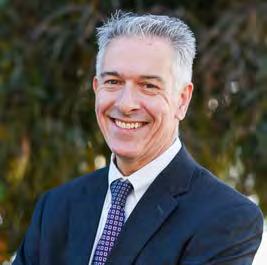

organized by Jeanine Reisbig Seniors

SF Pride honors community leaders
8 • Bay area reporter • March 7-13, 2024 t
<< Election 2024
Jeanine, Age 72, and Gale, Age 75, would love to stay in the apartment they’ve lived in for 43 years. Please donate to their GoFundMe page so they can buy their apartment and continue living there. Note: any amount will help. If you don’t have much money, even small donations are great!!!
cost of real estate in San Francisco is pretty high, hence the $300,000.00 goal.
you are not comfortable making an online donation, you can snail mail your donation to: Jeanine Reisbig, 584 Castro St. #231. San
make out your check
The
If
Francisco CA 94114. Please
to Jeanine Reisbig. www.gofundme.com/f/we-want-to-buy-our-apartment-and-avoid-eviction
Steven Buss, left, joined Mayor London Breed, center, and state Senator Scott Wiener in looking at early election returns Tuesday night at Anina in Hayes Valley.
John Ferrannini
Alameda County Court Commissioner Mark Fickes
Courtesy the candidate
The San Francisco LGBTQ Pride Celebration Committee on February 29 recognized several community leaders at its Ken Jones Awards ceremony. The program is named after the Pride board’s first African American chair who died in 2021 and was held in the Cityscape Lounge at the Hilton Union Square. Those honored included Marsha H. Levine, left, with the Teddy Witherington Award; Dennis McMillan (aka Sister Dana Van Iquity), the Audrey Joseph
LGBTQ Entertainment Award; Stephen Torres, the Pride Community Award; presenter Sister Roma; Adela Vasquez, José Julio Sarria History Maker Award; Julian Delgado Popera; and Marcel Pardo Ariza, Pride Creativity Award. Not pictured is Zwazzi Sowö, who received the Gilbert Baker Pride Founder’s Award. Not present were winners Michelle Alcedo, 10 Years of Service Award; and Yoseñio V. Lewis, who received the Pride Freedom Award.
Rick Gerharter

Xfinity now has more speed at the same great price. So you can do more of what you love with Xfinity Internet. More speed? Yup. Same great price? Double yup. for 2 years with no annual contract Taxes, and other charges extra and subject to change. See details below. $25/mo 50% more speed. Now 300 Mbps. 1-800-xfinity xfinity.com Visit a store today Restrictions apply. Ends 3/21/24. Not available in all areas. New Xfinity Internet residential customers only. Offer requires enrollment in both paperless billing and automatic payments with stored bank account. Without enrollment, the monthly service charge automatically increases by $10 (or $5 if enrolling with credit or debit card information). The discount will appear on your bill within 45 days of enrolling in automatic payments and paperless billing. If either automatic payments or paperless billing are subsequently canceled, the $10 monthly discount will be removed automatically. Limited to Connect More 300 Mbps internet. All other installation, equipment, taxes & fees extra, and subject to change during and after promo. After 12 months, or if any service is canceled or downgraded, regular charges apply to internet service. Service limited to a single outlet. May not be combined with other offers. Internet: Actual speeds vary and not guaranteed. For factors affecting speed visit www.xfinity.com/networkmanagement. Call for restrictions and complete details, or visit xfinity.com. All devices must be returned when service ends. Prepaid card: $100 prepaid card requires new Xfinity Fast Internet customers to sign up online. Prepaid Mastercard® is issued by Pathward®, N.A., Member FDIC, pursuant to license by Mastercard International Incorporated. Mastercard and the circles design are registered trademarks of Mastercard International Incorporated. No cash access or recurring payments. Prepaid Mastercard valid for up to 6 months; unused funds will forfeit after the valid thru date. Terms and conditions apply. A virtual Prepaid Mastercard will be sent to your email address associated with your Comcast account within 14 weeks of service activation. Virtual card can be used where Debit Mastercard is accepted online, for phone/mail orders or in stores that accept mobile wallet. If there is no email address registered to the account, a physical Prepaid Mastercard will be shipped to Comcast account holder within 16 weeks of activation of all required services. Physical card can be used where Debit Mastercard is accepted. © 2024 Comcast. All rights reserved. Offline_Speed-Increase_ad_9.75x16_SanFran.indd 1 2/27/24 7:35 PM
Man’s murder conviction reversed in stylist’s death
by John Ferrannini
The San Francisco District Attorney’s office will be going forward with a new trial after a California appellate court reversed the homicide and robbery convictions of James Rickleffs stemming from the 2012 death of a gay hair stylist.

Randy Quezada, communications director for San Francisco District Attorney Brooke Jenkins, told the Bay Area Reporter that on March 15 a judge will see if all counsel is “ready to proceed” in retrying Rickleffs, who was found guilty in 2019 of murdering Steven “Eriq” Escalon.
“If yes, and there is a courtroom available, they will be assigned and go from there,” Quezada stated in an email February 28. “Jury selection would be a little later.”
As the B.A.R. previously reported, Rickleffs, 57, was sentenced in 2021 to 50 years to life in state prison. According to the California Department of Corrections and Rehabilitation, he is currently
<<
House seat
incarcerated at Mule Creek State Prison, in Amador County in the Sierra foothills.
The charges stem from 2012, when, according to prosecutors, Escalon, 28, and Rickleffs met during underwear night at the bar 440 Castro in the LGBTQ neighborhood.
“Rickleffs, as a straightidentifying man, went to the Castro with tape and a knife, sat there drinking, and I believe snorted narcotics in the bathroom, waiting for someone,” Escalon’s friend Roberto Tiscareno said during the August 2021 sentencing hearing.
After going home with Escalon to his Diamond Heights apartment early on the morning of June 12, 2012, prosecutors said Rickleffs tied Escalon up, gagged him, and poured poppers on his face to immobilize him. Then he left Escalon’s apartment with a suitcase of items including a laptop, Escalon’s checkbook, and a bankcard of one of Escalon’s roommates.
Escalon died of an overdose of amyl nitrates and gamma-hydroxybutyric acid, or GHB, according to the medical examiner’s report. He was found dead by his roommates and Rickleffs was arrested September 12, 2012 in possession of the suitcase.
During his trial, San Francisco Deputy Public Defender Niki Solis, a lesbian, argued that the death, though unfortunate, was the result of consensual BDSM sex and discussed Escalon’s alleged interest in drugs and BDSM sex, a defense the victim’s mother, Esmeralda Escalon, said at the time was inappropriate and inaccurate.
In a group discussion with Assistant District Attorney Julia Cervantes and Solis outside the courtroom after the 2019 verdict, the jury explained their reasoning behind their decision. Most said that they felt Escalon’s death was caused by many factors, including the obstruction of his breathing from the gag, his inability to move from being bound, and the drugs found in his system.
They did say, however, that although they unanimously agreed that Rickleffs did not intend to kill Escalon, it was the
robbery and disregard for human life that swayed them to find him guilty of felony murder.
Jenkins has since appointed Cervantes to the DA’s office’s innocence commission, an external advisory body to the DA’s office that investigates cases of innocence and wrongful convictions.
“I am honored that District Attorney Jenkins has selected me to serve as the DA representative on the Commission,” stated Cervantes, who is also lead attorney at the post-conviction review unit, back in 2022, when she was appointed. “As a prosecutor, I am always mindful of the rights of the accused and that the responsibility of the prosecutor is to seek justice and not merely to convict. I am committed to a successful Innocence Commission with an equitable and transparent referral process. I look forward to working with the other members of the Innocence Commission and doing this important work.”
‘Unable to resist’
The fifth division of the state’s 1st District Court of Appeal ruled October 24, 2023 – in an opinion written by Justice
Mark B. Simons – that “appellant’s murder conviction is reversed, although the People may accept a reduction of the conviction to involuntary manslaughter. Appellant’s conviction of robbery is reversed, although the People may accept a reduction of the conviction to petty theft.”
“If, after the filing of the remittitur in the trial court, the People do not bring appellant to retrial on murder and robbery within the time set forth in Section 1382, subdivision (a) (2)-60 days unless waived by appellant – the trial court shall proceed as if the remittitur constituted a modification of the judgment to reflect a conviction of involuntary manslaughter and petty theft and shall resentence appellant accordingly,” the ruling continued. “The trial court’s judgment is otherwise affirmed.”
The appellate court panel gave several reasons for its decision. For one, a California Supreme Court ruling in People v. Brown (2023) threw out the very jury instructions for a murder by poison charge that were used in Rickleffs’ case.
Simons also questioned the forensic evidence presented at trial. t
A number of Southern California LGBTQ leaders are aiming to join them come the 2025 congressional session. After narrowly losing two years ago to Congressmember Jimmy Gomez (DLos Angeles), fellow Democrat David Kim is again vying for the District 34 House seat.
The gay progressive lawyer would be the first out Korean American elected to Congress should he win. As of Tuesday night Kim was in second place among the five candidates with 24% of the vote, while Gomez was in first place with 53%.
Two other gay Democratic congressional candidates are mounting rematches against the Republican congressmembers they lost to in 2022. Seen as more of a long shot is progressive activist Derek Marshall, who is trying to oust Congressmember Jay Obernolte (R-Hesperia) from his District 23 House seat in the high country east of Los Angeles.
Based on the early returns, Obernolte has a comfortable lead in first place with 57% of the vote. Marshall currently has 43%.
From page 1 <<
Leg candidates
From page 1
In the two-person race to succeed termed out Senator Steve Glazer (DOrinda) from his District 9 seat that covers much of Contra Costa County and a portion of southern Alameda County, San Ramon City Councilmember Marisol Rubio is in second place with 36% of the vote.
Rubio, a gender-nonconforming, demisexual, biromantic, will compete in November against Assemblymember Tim Grayson (D-Concord) for the seat. He currently is in first place with 64% of the vote.
Gay former West Sacramento mayor Christopher Cabaldon is fighting it out for first place in the race for the open Senate District 3 seat. Senator Bill Dodd (D-Napa) is termed out of representing the sprawling district that includes portions of Contra Costa, Solano, Sonoma and Napa counties in the Bay Area as well as Yolo and Sacramento counties.
Cabaldon was in second place with 27% of the vote count Tuesday night, while Dixon City Councilmember Thom Bogue, a Republican who survived the Jonestown massacre when he was a teenager, was in first place with 29% of the vote.
In the crowded race for the open Assembly District 6 seat in Sacramento, it appears none of the out candidates will make it to November. Gay Republican Preston Romero was in third with 13% percent of the early returns.
Rosanna Herber, a lesbian elected member of the Sacramento Municipal
“We need your help to launch our general election campaign strong, and show that Democrats can compete EVERYWHERE – from the cities, to the suburbs and the rural High Desert,” wrote Marshall in a fundraising email he sent out as soon as the polls closed Tuesday at 8 p.m.
In the Coachella Valley gay attorney Will Rollins is once again trying to oust Congressmember Ken Calvert (R-Corona) from his District 41 House seat. It includes the LGBTQ resort and retirement mecca Palm Springs where Rollins now lives.
Receiving far more support from the Democratic Party this year compared to his inaugural bid in 2022, Rollins currently stands at 45% of the primary vote. Calvert’s share of the early returns is 46%.
“I’m honored that voters have once again entrusted me with the responsibility to flip this seat in November,” said Rollins. “In our first campaign in 2022, we gave Ken Calvert the closest midterm election of his 30+ year career, and we did it by bringing Democrats, Republicans, and Independents together who know that Calvert’s self-dealing might be good for his own bottom-line, but it’s
Utility District, and fellow Democrat Carlos Marquez III, who is gay, were both trailing in fifth place with 9%. And in ninth place with 2% was Democrat Evan Minton, a former legislative staffer who had hoped to be the first transgender man elected to the Legislature.
As for Palm Springs City Councilmember Lisa Middleton, aiming to become the state’s first female transgender legislator, she now stands in second place with 49% of the unofficial returns in the race for the 19th Senate District spanning Riverside and San Bernardino counties. Middleton was the only candidate to run against Senator Rosilicie Ochoa Bogh (R-Yucaipa), who is now at 51% of the vote count.
A trio of Bay Area incumbents all easily secured first place finishes Tuesday as they seek reelection come November.
Gay state Senators Scott Wiener (D-San Francisco) and John Laird (D-Santa Cruz) are currently at 71% and 66% in their respective races.
Assemblymember Alex Lee (D-San Jose), to date the only bi member of the Legislative LGBTQ Caucus, is leading his contest with 66% of the vote.
Bisexual contenders look to advance
Looking to join Lee as the second bi man in the affinity group for out legislators was Hawthorne City Councilmember Alex Monteiro, one of eight candidates running for the open Senate District 35 seat in Los Angeles County. Monteiro fell short, however, netting 6% of the vote so far.
Thus, it appears the lone African
bad for us. This November, we’re going to flip this seat and turn the page from his corruption-riddled career, and usher in a new generation of public-service leadership that will focus on bringing good jobs, wages, and benefits for Riverside County families.”
While none of the out Democratic candidates vying to succeed Congressmember Adam Schiff (D-Burbank) appear to have survived Tuesday’s primary race, gay Republican Dr. Alex Balekian, an ICU physician, is poised to advance to the November ballot. The Armenian American was in second place with nearly 20% of the early returns, with Assemblymember Laura Friedman (D-Glendale) the top finisher at 29%. State Senator Anthony J. Portantino (DBurbank) was holding on to third place Tuesday with 15%.
Rather than seek another term, Schiff is running for the U.S. Senate seat being vacated this fall by lesbian Senator Laphonza Butler (D), appointed last October to serve out the term of the late Dianne Feinstein. He is almost assured of winning the seat against Republican Steve Garvey in November due to Democrats’ advantage in statewide races.
American man in the LGBTQ caucus will continue to be gay Assemblymember Corey A. Jackson, Ph.D., (D-Perris). He was in first place in his reelection race for his District 60 seat with nearly 55% of the vote.
Fellow gay incumbent Assemblymembers Chris Ward (D-San Diego) and Rick Chavez Zbur (D-Santa Monica/West Hollywood) also easily took first place Tuesday as they seek reelection. Ward was unopposed and thus netted 100% of the vote, while Zbur is currently at 76% of the vote in his race.
Among the female bi candidates is Sasha Renée Pérez, one of five candidates running for the open 25th Senate District spanning Los Angeles and San Bernardino counties. She was in second place with 28.5% of the vote as of Tuesday night.
Bisexual Palm Springs City Councilmember Christy Holstege is again seeking the Assembly District 47 seat, having narrowly lost in 2022 to Assemblymember Greg Wallis (R-Bermuda Dunes). She netted 51% of the early returns, with Wallis currently in second place with 43% of the vote.
Two bi women, Dulce Vasquez and Sade Elhawary, were among the five candidates running for the open Assembly District 57 seat in Los Angeles County. Elhawary, who prefers the term fluid when it comes to her sexual orientation, would be the first Black Latina in the LGBTQ caucus if elected.
She is currently in second place with 27.4% of the early returns and is poised to compete against Efren Martinez, who is in first place with 37% of the vote. Vasquez is in third place with
Maebe A. Girl, a nonbinary drag queen elected in 2019 as the at-large representative for the Silver Lake Neighborhood Council in Los Angeles, had mounted her third bid for the District 30 House seat. While advancing to the November ballot in 2022, she is currently in fifth place with 6% of the vote.
West Hollywood Mayor Sepi Shyne, a former resident of Cupertino in the South Bay, had sought to be the first queer Iranian woman elected to Congress. But she was in 10th place with 1.17% of the vote Tuesday night.
Another gay Armenian American seeking the seat, Jirair Ratevosian, Ph.D., was also trailing based on the early returns. Ratevosian, a Democrat who had worked for Lee as her legislative director, was in eighth place with 2.45% of the vote.
California is currently the only West Coast state with LGBTQ representation in Congress, though candidates in Oregon and Washington are aiming to change that this year. Thus, LGBTQ political watchers will be looking to see if Democrats Jamie McLeod-Skinner and Eddy Morales survive their May 21 party-based primary races.
14% of the unofficial vote.
In the race for the open 58th Assembly District seat, bisexual Riverside City Councilmember Clarissa Cervantes is vying to succeed her older sister, lesbian Assemblymember Sabrina Cervantes (D-Corona), a married mom seeking the open Senate District 31 seat this year. According to the unofficial count early Wednesday, Clarissa Cervantes was in a tough fight for second place.
She was trailing fellow Democrat Ronaldo Fierro by five votes, with both at 27.1% of the vote. Their Republican opponent, Leticia Castillo, had taken first place with nearly 46% of the vote.
As for Sabrina Cervantes, she had fallen further behind Republican Cynthia Navarro into second place with 41% of the vote as of early Wednesday. Navarro was in first place with nearly 44%, leading by 1,272 votes.
Other Southern California races
Four gay non-incumbent candidates ran for open legislative seats in Los Angeles County. Lynwood City Councilman José Luis Solache is seeking the Assembly’s District 62 seat. He was in a close contest for first place against Republican Paul Jones, with both pulling in 38% of the vote. Early Wednesday, Solache was ahead by 10 votes.
In the Assembly District 54 race, Los Angeles County Democratic Party Chair Mark Gonzalez stands in first place with 46% of the unofficial returns. Fellow Democrat John K. Yi was in second with 31%.
McLeod-Skinner, a lesbian former councilmember in the Bay Area city of Santa Clara, is running again for Oregon’s District 5 House seat after falling short in 2022. She aims to take on a second time Republican Congressmember Lori Chavez-DeRemer of Happy Valley.
Morales is seeking the Beaver State’s open District 3 House seat, as Congressmember Earl Blumenauer (D-Portland) opted not to seek reelection this year. The queer Grisham City Councilmember is expected to attend a March 23 fundraiser in San Francisco being hosted by a number of local LGBTQ leaders.
Washington State holds its primary August 6, and like California, it selects congressional candidates based on a top-two system. Queer Democratic state Senator Emily Randall, a former Bay Area resident, aims to succeed Congressmember Derek Kilmer (D-Gig Harbor) in the Puget Sound region.
She would be the first out congressmember from the Evergreen State. But Randall is facing a tough campaign, as Kilmer endorsed Washington Public Lands Commissioner Hilary Franz to succeed him. t
Immigrants Ari Ruiz and Javier Hernandez both fell short in their Assembly races. In the District 52 contest Ruiz currently stands in fifth place with 8% of the vote, while Hernandez is in fourth place with 14% of the vote in Assembly District 53.
In Orange County gay Iranian Alex Mohajer was one of 10 candidates running for the Senate District 17 seat against state Senator Josh Newman (D-Fullerton), who was redistricted into it in 2021 and is in first place with 30% of the vote. Mohajer currently stands in sixth place with 6.6% of the unofficial count.
Former “Amazing Race” TV show contestant Dom Jones, a Black queer Orange County resident, is the lone person running against Assemblymember Diane Dixon (R-Newport Beach) for her 72nd District seat. Jones trails with 39% of the unofficial vote.
In the San Diego area Democratic veteran Joseph Rocha was one of three people running for the open Assembly District 76. He is in last place with 18% of the early returns.
Republican former San Diego city councilman Carl DeMaio is in first place with 44% of the vote in the race for the open Assembly District 75. He is the first out GOP candidate to have a decent chance of being elected to the California Legislature; currently in second place is Democrat Kevin Juza with 19%. t
Editor’s note: This story will be updated online as new vote totals are released.
10 • Bay area reporter • March 7-13, 2024 t << Community News
James Rickleffs Courtesy SFPD
42nd Street Moon’s ‘Falsettos’
Still stirring, even with false notes

 by Jim Gladstone
by Jim Gladstone
The young woman with the knit hat and notebook a few seats to my left at the 42nd Street Moon production of “Falsettos” last Saturday night was in her early twenties; about
the same age I was in 1984 when I saw the show’s first act –then a stand-alone piece called “March of the Falsettos”– presented on a makeshift stage in a college dining hall.
Watching her face repeatedly crumple into tears over the show’s extended denouement provided reassurance that my abiding affec-
tion for this work goes beyond wet-eyed gay nostalgia for my baby gay days (Something I’d begun to suspect after seeing a disappointing Broadway revival tour at the Golden Gate Theatre in 2019). Her reaction also served as a testament to the ultimate emotional wallop of composer William

John Bankston’s ‘20 Years in the Rainbow Forest’
by Robert Brokl
The two-decade survey of paintings by John Bankston, now at the Rena Bransten Gallery through April 20, features prime examples of the cartoony figurative work that’s brought him renown, along with more recent work reflecting shifts in media, mode of expression and his personal life.
The artist asserts his identity as Black and queer and adds animals (large cats) to the mix, along with humor and nods to gay subculture. The earliest work on view resembles scaled-up coloring books, while his more recent work evokes a fauxnaif world of vulnerability, evincing the influence
of the Chicago Imagists, whom he encountered while earning an MFA at the School of the Art Institute of Chicago.
This exhibition is titled “20 Years in the Rainbow Forest, but his airy woodland of stylized trees and flowers is less Sierra Club than Radical Faeries, the gay subculture movement formed in the late 1970s that played with pansexuality, hippie drag and outdoor celebration. (Burning Man may be a more mainstream and heterosexual adaptation of similar anarchic impulses.)
Bankston’s escapist playland (not meant pejoratively) may be populated with Black gay men, but his work overlaps with the same narrative tradition of Bay Area feminist trailblazers like Joan Brown and Viola Frey.
As it happens, Bankston worked for a time in Frey’s studio, producing figurative ceramic sculpture. Her expressionistic, antic, simplified depictions, so dissimilar to the photo-realists who were also members of the Oakland College College of Arts and Crafts faculty, may be another influence, although Bankston’s world is more fantasy-based.
Joan Brown’s repetitive use of a stylized version of herself as painter, swimmer, lover, and seeker is echoed in Bankston’s use of a male figure, presumably the artist, often solitary and gazing at the viewer. He shares Brown’s use of feathery brushstrokes and her fascination and identification with lions and tigers–in his case, as companions, muses and guardians.
Finn’s crossword-worthy lyrics and sung-through score. The music’s emotional impact is strong enough to overcome some sorely dated characterizations and relationships co-created with original director James Lapine.
See page 14 >>
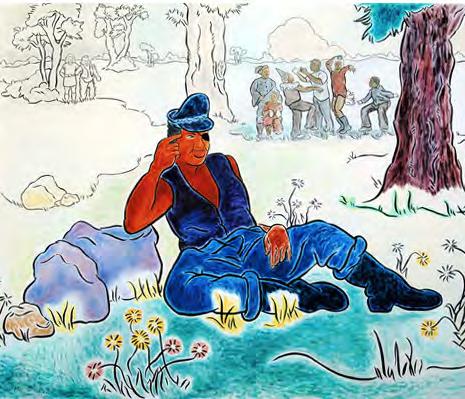
Cowboys and leather daddies
As with Brown, Bankston’s humans and animals sometimes blend and merge. Frequently, as seen in the show’s signature work, “Same Boat” (2007), figures wear animal skins and furs, more benign costuming or camouflage than spoils of big game hunting.
The “captain” in this painting is a studly Folsom Street leather daddy sporting an eye patch, cap, and vest over a bare torso. Interestingly, Bankston leaves one of his hands uncolored inside a black outline, an arty touch reminiscent of Warhol’s silkscreen printing “errors.” The same character takes center stage in “Midday Idyll” (2009). Provocatively lounging in a flowery meadow, he’s Ferdinand the Bull personified.
Bankston’s palette is bright, his “forest” a refuge, not a spooky, nightmarish entrapment. For the most part, his paint-handling is flat, as in a cartoon. One exception is the exuberant gay cowboy send-up “Pink Sunset” (2004) in which he plays with loaded brush strokes and arbitrary, splashy color, even adding blue swatches to a face.
Thematically, these unlikely cowboys wouldn’t raise eyebrows in a gay setting. There are gay square dancing groups, after all, but the image resonates in contemporary mainstream culture. Annie Proulx’s tragic “Brokeback Mountain” story appeared in 1997, with the Ang Lee movie version following in 2005. Pedro Almodovar revisited the tale and posited a less fatalistic ending in his recent “Strange Way of Life.” But Lil Nas X’s music video, “Old Town Road,” from 2018, aligns most closely with Bankston’s campy spoof.
Bankston has expressed admiration for the doomed, posthumously elevated Black painter
See page 16 >>
John Bankston’s ‘Same Boat’
John Bankston/ Rena Branston Gallery
John Bankston’s ‘Midday Idyll’
Yuval Weissberg, Will Giammona, Gary Brintz, Samuel Prince, and Ariela Morgenstern in 42nd Street Moon’s ‘Falsettos’
Ben Krantz Studio
by Laura Moreno
The incredible true story of 20thcentury Mexican painter Frida Kahlo (1907-1954), “Frida” is told from the artist’s own perspective.
Voiced by Fernanda Echeverría del Rivero as Kahlo, the film is based on primary sources including Kahlo’s personal illustrated diaries, essays, and print interviews punctuated with rare archival footage.
Although “Frida” is a documentary, this is a beautifully lyrical film with the pitch-perfect emotional feel and slick editing of a narrative film. The candid information it contains, including about her life as a bisexual married woman, may just make it the definitive Frida Kahlo film in a field with plenty of competition, including narrative films starring talented actresses Ofelia Medina and Salma Hayak.
Entranced by Her Art Kahlo’s paintings are strangely intimate and other worldly, often with a tragic edge. Many people feel entranced by her disturbingly beautiful art, which has the power to communicate what words are powerless to impart.
After a trolley accident left Kahlo bed-ridden for years, she turned a minor hobby into her life’s work, expressing herself through her painting as a way to make sense of her condition and seek a shared bond with the viewer.
“Intimate, raw, intense, vibrant, and sometimes very painful,” says debut
Falsettos
From page 13
Dated duos
The big swinging albatross of “Falsettos” is that it strives to normalize same-sex partnerships while simultaneously reinforcing stereotypical roles within its three fictional couples.
It’s 1979 when we meet fortyish Marvin (William Giammona, courageously embracing his characters unpleasantness), around whom the show –and in his mind, the universe–revolves.
He’s recently left his wife, Trina (Ariela Morgenstern), and 11-year-old son Jason to move in with his younger boyfriend, upbeat and level-headed Whizzer (Samuel Prince).
Trina has long bridled at playing the happy housewife of Marvin’s fantasies

director Carla Gutierrez about the art of Kahlo. Gutierrez is better known as the editor of films like “Chavela” about singer Chavela Vargas, one of Kahlo’s female loves.
Impressive new animations make her art come alive in the film. They emphasize the heartache the art depicts, but such efforts can easily tip into sappy schmaltz for the viewer with a cold eye.
Although it’s hard to believe, Kahlo was far less famous during her
(Well, one set of them). She provides hot dinner and a frequently forced smile when he returns from his wellpaying, unspecified office job each day.
But what she might want instead is unclear, and made no more so after she continues this routine after getting remarried to Mendel (Gary Brintz), a psychiatrist whose free love 1970s professional ethics are as loose as his dashikis (Stephanie Dittbern’s costumes are accurate enough to provoke retrospective embarrassment).
Meanwhile, beyond their sex lives, Marvin makes the same demands of Whizzer as he did of Trina. Finn and Lapine’s paltry representation of a male couple consists of a professional working man and stay-at-home golddigger pretty boy (Giammona and Prince help compensate with more

Monday 8am (last
Tuesday 8am (last seating 9:45pm)
Wednesday 8am (last seating 9:45pm)
Thursday 8am
Open 24 Hours
Friday
Open 24 Hours
Saturday
Open 24 Hours
Sunday 7am (last seating 9:45pm)

Ahead of Her Time
The film uncovers territory most fans of Kahlo know little to nothing about, such as her penchant for dressing in men’s clothes in college, and a painful miscarriage she and her husband endured.
“Frida” also lets us in on her most private thoughts regarding a wellpublicized affair with Leon Trotsky, whom she quickly grew to dislike. Trotsky, a star-crossed lover, apparent bigamist and would-be revolutionary in exile, and the person most responsible for the militaristic despotism Communism became –a far cry from the “land, bread and freedom” he vociferously promised – was soon murdered in his house in Mexico City by an assassin sent by Stalin.
Breton’s interpretations of her work, including attempts to dissect her art using Freudian analysis, now largely discredited.
Furthermore, she did not consider herself a surrealist, like Spain’s most wildly successful artists Salvador Dali and Pablo Picasso, and was frustrated by understandable attempts of the artistic establishment to push her in that direction.
Her unvarnished thoughts in Spanish on what she perceived to be misinterpretations of her work defy translation and make up some of the most memorable parts of the film.
Kahlo’s introspective self-portraits, painted in a magical style all her own, were perhaps too far ahead of their time to be fully appreciated by the public while she was alive.
lifetime than her more successful husband Diego Rivera (1886-1957), whose art perfectly embodies the spirit of the age after the Mexican Revolution as Mexico began industrializing. Rivera’s compelling murals extol the working man in prominent spaces throughout Mexico.
Interestingly, the artistic couple had an open marriage, although a tempestuous one, and lived in adjoining blue houses from which they pursued their individual artistic visions.
textured performances).
The second act, set in 1981, introduces a lesbian couple: A butch, unkempt doctor (Cindy Goldfield) and a winsome, ditzy would-be caterer who calls her partner “Mommy” (Monica Rose Slater).
It’d be hard to blame a millennial for heading to an emergency exit.
Transcendence through sorrow
But there are rich rewards for sticking with “Falsettos,” presaged by Act I’s closing song, “Father to Son.” With a far tighter narrative structure, Act II galvanizes the selfish, shapeless yowls and yearnings of its prologue into momentous storylines with eternal urgency.
As much as it flounders with coupled romantic relationships, “Falset-
Now that we know the Communist Revolution was funded by bankers in London, one of many of their social experiments, it is clear that history is a concerted effort to push certain things to the fore while leaving far more historically worthy subjects in obscurity.
But the film glosses over Kahlo and Rivera’s devotion to the Communist cause, which seemed like a big deal at the time, but perhaps was nothing more than a cruel distraction in retrospect.
During her lifetime, Kahlo exhibited her art in New York and Paris with the help of writer André Breton. The film entertainingly takes us behind the scenes to understand the artist’s vehement disagreements with
tos” does a beautiful job at eliciting the complex intertwinement of a child and the community of loving adults around him. It also underscores the mutual compassion and shared humanity that can emerge in the face of tragedy.
As Jason prepares for his impending bar mitzvah, we sense the tug between his wish for independence and his craving for protection. (Madelyn Simon, who alternates with Yuval Weissberg, plays Jason with unprecocious naturalism).
And we see Marvin and Trina, who have inflicted so much hurt on their son, desperately wishing they could protect him from the pain of the wider world.
That pain and its attendant sense of helplessness are embodied by Whizzer’s battle with AIDS, which serves,
Ironically, she never aspired to become an artist, even though her beloved atheist German father was a talented photographer. If not for the serious medical condition she found herself in, Kahlo would have become a doctor.
“Frida” is an LGBT film that synthesizes huge amounts of information to give audiences real insight into the complex woman and great artist; tender-hearted, strong, rebellious, intelligent, forthright, and always highly creative. It makes us feel that Frida Kahlo is once again alive to confide in us personally.t
Watch ‘Frida’ on Amazon Prime starting March 14. www.fridakahlo.it
with cruel irony, as a catalyst for community. The broken family and its circle of friends pull together, transcending their differences in shared sorrow.
As Whizzer, Samuel Prince brings a sheen of elevated charisma to the otherwise earthy, intimate performance style of director Dennis Lickteig’s production. As his castmates buzz about in harmonized neurosis, he moves and sings with a singular clarity and self-possession perfectly attuned to his character.
Prince’s Whizzer proves this “Falsettos”’ guiding star. Follow him all the way to the bittersweet end.t
‘Falsettos,’ through March 17. $40-$73. Gateway Theatre, 215 Jackson St. (415) 255-8207. www.42ndstmoon.com

14 • Bay area reporter • March 7-13, 2024
new documentary on the life
t << Film & Theater 3991-A 17th Street, Market & Castro 415-864-9795 Proudly serving the community since 1977. Open Daily! New Adjusted Hours
‘Frida’ Magical
of artist Frida Kahlo
seating 9:45pm)
<<
‘Frida’
Archivo Manuel Álvarez Bravo
Will Giammona, Yuval Weissberg, and Ariela Morgenstern in 42nd Street Moon’s ‘Falsettos’
Ben Krantz Studio
Singer/songwriter Katy Kirby is True ‘Blue’ t Music >>
 by Gregg Shapiro
by Gregg Shapiro
It’s only March, but there’s no doubt that the album “Blue Raspberry” (Anti-) by out singer/songwriter Katy Kirby will have a place on my best of 2024 list.
Texas-native Kirby, now based in Brooklyn, is a distinctive young songwriter, and she performs her songs with a confidence that belies her age. “Blue Raspberry” has been on repeated spins since it arrived, and I’ve been enthusiastically recommending other songs to friends and family, for their artistry and irresistible sound. In our interview, Kirby discussed her musical inspirations.
Gregg Shapiro: In the Thank Yous for “Blue Raspberry,” you mention “the archives of Arthur Russell at the New York Public Library for the Performing Arts.”
What are your influences regarding the late gay songwriter Russell?
Katy Kirby: I have been a fan of his songwriting for years. I found out through a friend of a friend that the New York Public Library had received his archives recently and had started opening them to the public. My guitar player and producer Logan (Chung) did the bureaucratic research to figure out how to get in there.
Those librarians were so helpful. They were like, “Yeah, touch all these pieces of paper with your hands.” They have some of Arthur Russell’s pencils! They want people to see it. It was so exciting. We got to hear a bunch of demo tapes and stuff from sessions. If I’m just basing it off his scribbled notes, he was just as wacky of a guy as one might think. It made me feel very seen.
Are there other musical influences and inspirations you’d like to mention?
I like the way that Angel Olsen records always sound pretty sweeping, even when they’re quiet. We’ve been listening to a lot of Sam Cooke recently before we started to make the record. And songs that were very obviously love songs from that era.
Your Anti- label mate Christian Lee Hutson, who has worked with Phoebe Bridgers, is also credited as a co-writer on “Party of the Century.” How did you come to collaborate with him?
We became friends on the Internet and then we hung out in real life. We wrote that (song) over FaceTime just for fun a couple of years ago, I guess. We threw a bunch of things at the wall and then weren’t really sure if we had made anything good or not. Then I whittled it down a little bit, and as it turned out there was kind of a little bit of a story in that song. So, that was nice.
You come from an evangelical Christian background. Other queer performers had a related experience. How did your family
react to your coming out?
It was interesting. I really didn’t have a coming out experience per se with them. I was 26 when I started dating a girl for the first time. It was someone that they had known for a while. She was someone I went to college with. I didn’t really feel like I made an announcement. We just started seeing each other. Then I told my mom, I told my dad, and I told my
siblings. They were all like, “Okay!” I don’t know if I ever said it out loud, like “I’m gay.” I just said, “I’m dating.”
Anti- Records has a long history of queer acts on its roster including The Drums, Bob Mould, and Ezra Furman. How does it feel to be in such company?
Honestly, being on Anti- Records was at the top of my internal bucket
list of goals. It felt really weird after signing with them because I didn’t think I would achieve that goal as early in my career. I had no other goal to work towards. I felt adrift because I really have loved that label so much and respected how they’ve been. I was completely unmoored by signing with them. It was great.
At the recent Grammy awards, queer women were well represented among the winners and nominees. As an out artist, what does that kind of representation mean to you?
The thing that I thought about the Grammys the most recently is how precious it is. There are these pictures of boygenius with their Grammys that I saw, and Julien Baker obviously has just been weeping. Not like celebrity, “I won a Grammy!” happy weeping, but she looks like she’s actively crying. It’s so cute!
It makes me feel a little more confident that the songs on “Blue Raspberry” can enter the category of love songs without necessarily having the queer label indelibly attached to it. I think it’s important that they’re queer love songs, but also, they get to expand a little bit out of that world as well. It’s not such a niche category.
What are you most looking forward to about the concert tour on which you are embarking?
We’ve played a couple of shows on this tour, so far, and it’s been very fun. I’ve really been enjoying playing some of the songs on this record that I was scared to perform live, like “Redemption Arc” or “Hand to Hand,” or some of the slower, weirder ones. Those have been challenging, but fun. A couple of people have been singing along to those in some of those crowds, which is shocking, but nice.t
Read the full interview, with music videos, on www.ebar.com.
www.kirbykaty.com


March 7-13, 2024 • Bay area reporter • 15
and get support, go to https://www.cavshate.org/.
This
resource is supported in whole or in part by funding provided by the State of California, administered by the California State Library in partnership with the California Department of Social Services and the California Commission on Asian and Pacific Islander American Affairs as part of the Stop the Hate program. To report a hate incident or hate crime
Katy Kirby at a recent AudioTree online concert
Comedy tonight?


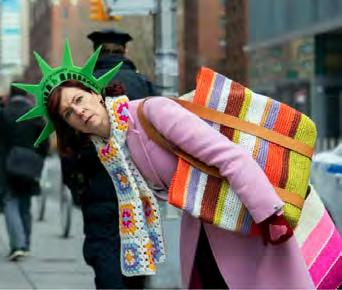 by Victoria A. Brownworth
by Victoria A. Brownworth
Like Charlie Brown with that football, we keep tuning in to “Saturday Night Live” most Saturday nights to watch political satire and maybe hear some good music from the weekly guest, only to have that football of fun swiped away.
We should say “hope for” some political satire like we recall from not that long ago, when resident lesbian comedian and multiple Emmy-winner Kate McKinnon played everyone from Trump attorney general Jeff Sessions to Trump lawyer Rudy Giuliani to Hillary Clinton and Elizabeth Warren to Long Island medium Theresa Caputo to lesbian cat ladies.
which Ego Nwodim’s character says she matched with gay talk show host Andy Cohen, but it’s okay because “I like a little fruit with my salad.”
Really?
Then in another skit, Nwodim, this time playing a high school cheerleader, was again tasked with delivering a cringeworthy line when she tells a basketball player that it’s okay, she refuses to use condoms. Ironically, that skit was followed by an ad for HIV PrEP medication.

And then there was the whole skit in which the premise is that Bowen Yang, who is gay, is actually straight. “He just plays gay on the show because it’s a shortcut to laughs.” Later, we see Yang’s character having sex with a woman. Why?
To quote Edith Bunker, those were the days.
SNLow
On March 2, “SNL,” with host Sydney Sweeney, went from bad to terrible with not a single funny sketch and a cold open that was just insulting. Look, we get it: Joe Biden is old.
But is that funny? Maybe the first time they did a skit about it four years ago, but now it’s just lazy, tedious, unfunny pseudo-comedy. Political satire is supposed to be sharp and incisive and skewer the people in power. This is not that.
Throughout the Trump years, “SNL” did some fantastic comedy. In fact, Melissa McCarthy’s repeated portrayals of Donald Trump’s first press secretary, Sean Spicer, was so devastatingly spot on, Trump fired him.
It wasn’t just the unfunny cold open. It was the throwaway line in one skit about matching with celebrities in
<< John Bankston
From page 13
Bob Thompson, whose work was influenced by jazz and noted for simplified, flattened figures with political references. “The Prince 1” (2014) suggests the heroic Haitian liberator and former slave Touissant Louver-
This is the point where we say, “Do better,” but we aren’t sure “SNL” can do better. On the February 24 show, comedian Shane Gillis, who was fired from the show before he ever actually aired when it was discovered he had a history of racist and homophobic
messaging, did much of his monologue making jokes about people with Down Syndrome. Though he did have some throwaway lines about gays, too.
Biden appeared on “Late Night with Seth Meyers” with the former “SNL” head writer and was both funny and serious. Biden talked about his age, Taylor Swift, ice cream, Trump and national security. GOP rumors of his advanced dementia are wildly exaggerated.
NYPD blew it
CBS has a new series with Carrie Preston, who previously co-starred in “The Good Wife” and “The Good Fight,” as quirky attorney Elsbeth Tascioni. “Elsbeth” brings Preston’s character from Chicago, where the previous two series were set, to New York City. Elsbeth is tasked to be an outside observer for the Justice Department to ensure the NYPD is transparent and not doing bad policing. The NYPD is facing a lawsuit for unlawful arrests and Elsbeth is highly problematic for the department.
The series is, like the previous series, both episodic and with a running storyline. Wendell Pierce, who

ture, wearing his signature uniform, a dressy “European-style” waistcoat with gold buttons and epaulets. Here, he’s more boyish, practicing revolution. His most recent work reflects the isolation of the pandemic, the George Floyd protests and a milestone birthday (60). The figures, rendered with

never fails us, plays a tired and exasperated Captain C.W. Wagner. Carra Patterson plays Elsbeth’s cop partner officer Kaya Blanke who is skeptical. “Modern Family” alum and gay actor Jesse Tyler Ferguson, plays an Andy Cohen-esque producer of a “Real Housewives” show “Lavish Ladies.”
Other guest stars include Stephen Moyer, Retta, Jane Krakowski and Blair Underwood. It’s funny while delving deep into current issues about police corruption and racism and has a lot of queerness. Preston is just mesmerizingly good. “Elsbeth” airs on CBS Thursdays.
Awards watch
With the Oscars starting an hour earlier this year on March 10, prep your watch party for high tea and hope for some queer wins. We are aching to see Two-Spirit nonbinary actor Lily Gladstone win best actress for her role in “Killers of the Flower Moon,” a harrowing story of the murders of members of the Osage Nation in Oklahoma in the 1920s. Gladstone is the first Native American woman to
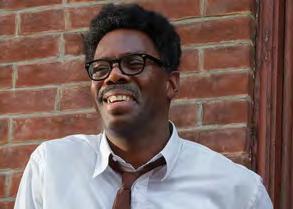
acrylic and oil pastel –minus the black outlines seen in early works– seem more vulnerable.
Unfortunately, the 2024 suite of acrylic drawings on Carta Pura paper titled “A Walk in the Woods,” is not on display. Ask, and the gallerists will gladly show it to you. Like Chi-
be nominated for best actress.
Gladstone goes by both she and they pronouns. She explained in 2023, “In most Native languages, most Indigenous languages, Blackfeet included, there are no gendered pronouns. There is no he/she, there’s only they... my pronoun use is partly a way of decolonizing gender for myself.” Gladstone identifies as “middle-gendered” and a member of the LGBTQ community.
Gay actor Colman Domingo is nominated for his amazing portrayal of gay Civil Rights leader Bayard Rustin in “Rustin.” Domingo told Deadline, “It’s very important for me, especially after a film like ‘Rustin,’ that [Bayard Rustin] is pulled out of the shadows of history, and he’s taken his rightful place in the center of his own story.”
Nick Offerman, who is always showing people how to be a good LGBTQ ally, called out homophobic hate during his Spirit Awards acceptance speech last week. Offerman won best supporting actor in a new scripted series for his role in “The Last of Us,” which we wrote about here a year ago and which makes us tear up just thinking about how beautiful it was.
Offerman said, “Thanks to HBO for having the guts to participate in this storytelling tradition that is truly independent. Stories with guts that when homophobic hate comes my way and says, ‘Why did you have to make it a gay story?’ We say, ‘Because you ask questions like that. It’s not a gay story, it’s a love story, you asshole!’”
So, for the sublimely comedic and the deeply tragic, you know you really must stay tuned t
Read the full column, with video clips, on www.ebar.com.

nese ink-and-brush paintings, these sepia-toned works, with washes of subtle color, are gems. “#6 A Mournful Dance to the Sound of the Lost Horn” and “#8 Music Makes a Bond” are especially fine.
Good news, camping is explicitly permitted in this Rainbow Forest.t
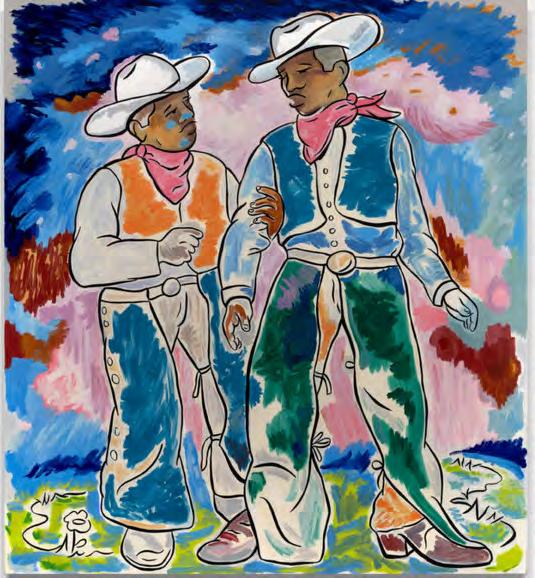
John Bankston’s ‘20 Years in the Rainbow Forest,’ through April 20 at Rena Branston Gallery, Minnesota Street Project, 1275 Minnesota St. Open Wed-Sat., 11am-5pm. www.renabranstengallery.com

16 • Bay area reporter • March 7-13, 2024
t << TV & Fine Art
The Lavender Tube on ‘SNL’s fails and more
Left: Sydney Sweeney and Bowen Yang and Middle: Ego Nwodim on ‘Saturday Night Live’ Right: Carrie Preston in ‘Elsbeth’ NBC
Left: Lily Gladstone in ‘Killers of the Flower Moon’ Middle: Colman Domingo as Bayard Rustin in ‘Rustin’
Right: Nick Offerman at the Independent Spirit Awards
Independent Spirit
NBC Elizabeth Fisher/CBS
Apple TV
David Lee/Netflix
Left: John Bankston’s ‘Pink Sunset’ Right: John Bankston’s ‘Prince 1’
Both photos: John Bankston/ Rena Branston Gallery
Madonna rocks the Chase Center


 by Jim Provenzano
by Jim Provenzano
“The most controversial thing I’ve done is to stick around,” says Madonna in a recorded segment from the dizzying array of montages that document her 40-year career in her Celebration Tour, which dazzled audiences at a sold-out Chase Center concert on February 26 and at a second show on the 27th.
The epic multimedia extravaganza of music, dance, pyrotechnics and projections spans Madonna’s career from her early days in New York City through her multiple recreated identities and music styles.
Over the more than two-hour concert, fans (many of them LGBT, of course) were treated to remixed beefedup versions of her songs, as well as some stripped-down acoustic versions that reimagined the original intent.
Kicking off only an hour late, MC Bob the Drag Queen entered from the main floor back entrance, where he affectionately clocked a few gay couples, then strutted through the crowd and on stage in an 18th-century gown that tipped a wig to Madonna’s sensational Marie Antoinette-themed performance of “Vogue” at the MTV Awards (originally choreographed and directed by Vincent Paterson, who also directed her Blonde Ambition tour back in the 1990s).
Commotion
Madonna herself, triumphant at 65, having endured serious health problems and delayed shows, ap-
peared alone in a dark robe atop the upstage circular set piece, setting off the first of her 30-song set with “Nothing Really Matters.”
It was only the first section of a seven-act epic concert, the first delving back to her early New York City rise to fame. “Everybody,” “Into the Groove,” “Causing a Commotion,” and “Open Your Heart” featured the 14 fabulous dancers in a variety of retro-glam costumes designed by Yohannes and Rita Melssen.
After taking a solo turn on a downstage platform, part of the extensive array of runways, Madonna strummed an electric guitar and cranked out a CBGBs punk version of “Burning Up” as ’80s graphics flashed on the screens. A wry skit followed, where Bob the Drag Queen played a snobby doorman.
While the subsequent “Holiday” began with buoyant nightclub joy, replete with a giant disco ball, toward the end a few dancers collapsed to the stage floor, signaling the somber second act.
As Madonna sang “Live to Tell,” the five two-way projection screen displays, directed by Sasha Kasiuha, showed headshots of prominent people who died of AIDS, from Keith Haring to Sylvester and designer Halston. Then they multiplied to dozens, then hundreds of faces.
The dark stage drama continued as Madonna and her cocreators (Lewis James and Jamie King) shifted to a BDSM-styled “Like a Prayer,” as shirtless dancers in hoods hung from slots


in the circling stage with bright crucifixes. The intense choreography’s directors include several talents: Travis Payne and Megan Lawson, Sidi Larbi Cherkaoui and Damien Jalet, and Nicolas Huchard.
From the first thumping beats and black-and-white projected footage of Act III, fans knew that the next song, “Erotica” would pack a wallop. What wasn’t expected was a sporty take on it with hunky dancers sparring between LED-shaped boxing rings.
Always a proponent of sexy bisexual erotic imagery in her stage acts, Madonna continued through with “Justify My Love,” the zesty “Hung Up,” (yes, shirtless male and female dancers) and a brief excerpt of the Peggy Lee hit, “Fever.” Overhead camera work showed an oscillating orgy of nearly nude dancers spreading out into a Busby Berkeley-esque kaleidoscope.
And in a stirring softer segue to “Bad Girl,” Madonna’s daughter Mercy accompanied her on a piano.
Give good face
The show’s many roving camera operators (part of the 175-member crew) really got to shine in Act IV’s extended “Vogue” number. Along with a montage of historic LGBT protests and people, Bob the Drag Queen channeled Big Freedia as he rattled off compliments and demands to the dancers, who death-dropped their way along the downstage ramp.
Guest performers included Madonna’s 11-year-old daughter Estere, who mopped the floor with other competitors. The seated guest judge of the night with Madonna was “RuPaul’s Drag Race” star Trinity the Tuck, who seemed a bit gob-smacked to be sharing a stage with Madonna. Who wouldn’t?
After getting “arrested” through “Human Nature,” Madonna reappeared in a silver bodysuit for “Crazy for You.”
Act V was on fire, literally. As the upstage tiered circle’s pyrotechnics rivaled a Wagner opera, a recorded Madonna recited a biblical-styled monologue. Occult images flew by and the dancers tumbled about in post-apocalyptic garb.
The drama continued in “Die Another Day” (her commissioned Bond film theme song), then turned upbeat country for “Don’t Tell Me” with cowboy hats and chaps-clad dancers.
“Mother and Father” included a tribute to Madonna’s own mom, followed by a brief unrehearsed speech (changed with each city) in which she told us about a family road trip from Michigan to San Francisco where she only got a glimpse from the family car to peer at “the girls with flowers in their hair and the men with long hair.”
After referencing the ongoing wars overseas, Madonna asked the audience to light up their phones “with love” as she crooned a plaintive solo guitar version of “I Will Survive,” a Gloria Gaynor cover.
The pace picked for her “La Isla Bo-
nita” and an excerpt of “Don’t Cry for Me Argentina” from the musical “Evita,” the film adaptation in which she starred. Madonna was then draped in the new Pride flag as she exited.
Ray out
Act VI opened with a dizzying montage of Madonna media clips, news headlines, concert footage and profound quotes, into “Bedtime Story,” which she sang atop a multi-animated cube (and more clever overhead camera shots). For the fervent “Ray of Light” she again rode the floating cubicle, thankfully safely harnessed. It should be mentioned that she’s also singing quite well, albeit in a deeper mezzo voice, as heard in the subsequent calmer “Rain.”
Unlike the earlier short homage to Prince, the seventh and final act’s Michael Jackson homage, a mashup of “Billie Jean” and “Like a Virgin” with a shadow dancing duet, felt out of place, but understandable since they were friends.
The evening closed with a vibrant spin on “Bitch I’m Madonna” and “Celebration” with the dancers dressed in a living history of Madonna’s mul-
tiple looks, from Material Girl to Evita, with Nicki Minaj on-screen offering a quick rap tribute.
As fans left the Chase Center to pose in front of illuminated billboards and buy up merchandise before packing aboard the T line, ebullient conversations continued as we tried to savor what was truly a fantastic night. t
Madonna’s Celebration Tour continues in Los Angeles (through March 11) and other North American cities through April 26.
www.madonna.com
www.chasecenter.com






March 7-13, 2024 • Bay area reporter • 17
t A Night to Remember>> StevenUnderhill 415 370 7152 • StevenUnderhill.com Professional headshots / profile pics Weddings / Events Personals Massage>> EDUARDO 9” Express massage in tension level and happy ending without pain. Text me 628-219-3747
Above: Madonna’s ‘Like a Prayer’ in her ‘Celebration’ concert tour
Below: The ‘Live to Tell’ AIDS memorial in Madonna’s ‘Celebration’ concert tour
Above Image: Getty Images Kevin Mazur for LiveNation Below Image: Cornelius Washington
Left: Madonna in her ‘Celebration’ concert tour Middle: Madonna floats in a cube in her ‘Celebration’ concert tour Right: A ‘Vogue’ dancer and judge Madonna
All photos: Getty Images Kevin Mazur for LiveNation
Spring books 2024 roundup, part 2
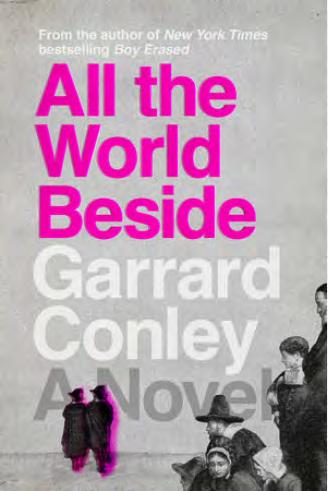 by Jim Piechota
by Jim Piechota
In the second of our Spring books series, we present several fiction titles by a memoirist and a trans woman that are set to make a splash in the literary world. Also included is a biography by trans glamour girl Candy Darling, a memoir from a queer Tennessean poet, and introspective discussions on gender, queer nightlife, and, like, the cult film classic “Mean Girls.” There’s never a dull moment in the book world this spring. Dive in and start enjoying these outstanding titles.
FICTION
“All the World Beside” by
Garrard Conley
, $28 (Random House) March 26
This exemplary work of historical fiction comes on the heels of Conley’s memoir about his homophobic Baptist childhood, “Boy Erased,” which was a critically acclaimed success upon its 2016 publication, and adapted into a film in 2018. Here he probes the restrictive nature of puritanical America and how queer men managed to thrive.
Set in 1730s Massachusetts, Nathaniel, a preacher and married family man, secretly falls in love with the village’s resident physician, Arthur, and both attempt to move forward together, whispering their forbidden feelings for each other in the shadows amidst a rampantly homophobic conservative culture.
Conley infuses his engrossing narrative with meticulous research into 18th-century queer history and how same-sex relationships bloomed and survived. The reactions by family members and villagers alike make up the book’s most poignant moments, while

“Love the World or Get Killed
Trying” by Alvina Chamberland, $18 (Noemi Press) March 20
This is the English-language debut for Chamberland, a Swedish American author who is known for penning provocative works of literary autofiction. In this novel, she becomes her own protagonist navigating an “animal kingdom”-type world populated by cis-men who sexualize her body, her voice, her clothing, her movements, and her general appearance, for carnal pleasures.
Alvina, a trans woman, is on the cusp of her thirtieth year and partakes in the pleasures of her homeland of Berlin but strikes out to write a travelogue about a trip to Iceland where she appreciates the awe-inspiring natural beauty of the glaciers yet is disillusioned to discover so many straight families attending a gay Pride parade in Reykjavik.
The narrative style is often fragmentary and grouped into large blocks of prose resembling poetry but embedded with passion, urgency, queer rage, and a nonstop barrage of italics, capital lettering, and impactive punctuation. This unique first-person narrated alternative novel is a shocking cold-water plunge just when you need it most.
MEMOIR
“Be Not Afraid of My Body: A Lyrical Memoir” by Darius Stewart, $19.99 (Belt Publishing)
This brazen, earnest, unapologetic self-portrait by poet and University of Iowa literary studies doctoral fellow Darius Stewart takes readers through his life thus far as a Black, queer, and HIV-positive man who grew up in a housing project in
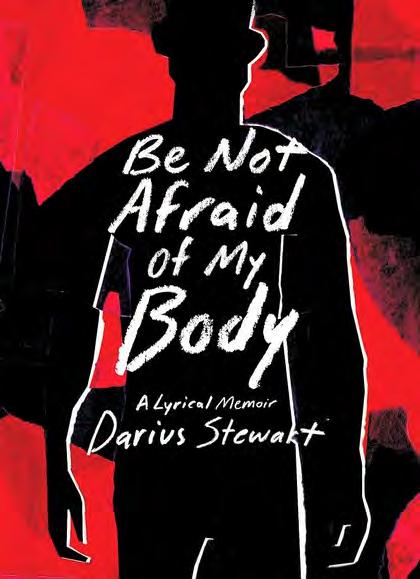
poetic rhythm, describe a childhood where religion was the fuel keeping him in fear of his own safety; teenage years trying (and failing) to pass as a straight boy; and ventures into substance abuse and reckless sexual abandon. This intensive lyrical memoir will resonate among readers of color and those who huddle at the outer margins of queer culture for fear of ridicule or rejection.
BIOGRAPHY
“Candy Darling: Dreamer, Icon, Superstar”
by Cynthia Carr, $30 (FSG)
This dynamic biography chronicles the life and legacy of glamorous trans pop culture icon Candy Darling. Journalist Cynthia Carr spares no detail in presenting her life beginning as a young lonely queer boy born in 1944 in Long Island where her life was made a living hell by an abusive parent and unmonitored schoolhouse bullies.
She began a new life as a woman in her early 20s, frequenting Greenwich


Village queer clubs and rubbing elbows with Andy Warhol, who cast her in his films “Flesh” and “Women in Revolt.” These creative endeavors garnered Darling fame but not fortune and when the money dried up, she turned to escort work to make ends meet.
Carr beautifully reconstructs 1960s Manhattan and all the bohemian escapades enjoyed by the alternative communities who thrived there. Though Darling died in 1974, her inspirational life and work resonate throughout this fascinating and bittersweet tribute.
NON-FICTION
“Who’s Afraid of Gender?” by Judith Butler, $30 (Farrar, Straus & Giroux) March 19
In an informative and surprising study, Butler, a gender studies authority, argues that right-wing political officials utilize the argument of gender and gender transformation and expression to deflect from the more impactful issues deserving of public scrutiny like warring nations and climate change.
She philosophizes throughout her scholarly narrative that gender is a combination of nurture, nature, and cultural influences and shouldn’t be weaponized or demonized by any group, political or otherwise, for nefarious purposes. Important and instructive, Butler’s urgently written, academic probe of gender and the enduring fight surrounding its meanings, makes for eye-opening reading.
“So Fetch: The Making of ‘Mean Girls’ by Jennifer Keishin Armstrong ” $29.99
(Dey Street Books)
Anyone obsessed with the cult classic high school comedy “Mean Girls” (and the Broadway musical, the cast

recording, or the 2024 film remake) will want this inclusive and effortlessly entertaining companion volume on their shelves.
Media journalist Armstrong charts
Tina Fey’s journey toward adapting the screenplay (her first) from “Queen Bees and Wannabes,” Rosalind Wiseman’s 2002 examination of how high school girls gossip, bully, and eventually corrupt reputations in order to step up higher in their school’s social rankings.
Armstrong shares insider tidbits that will fascinate readers, such as Lindsay Lohan’s initial desire to be cast as the villainous Regina George (the request was dismissed by studio heads). This is a must-have book for fans who fetch like Gretchen Wieners, even though “fetch” is still not happening.
“Long Live Queer Nightlife”
byAmin Ghaziani, $29.95
(Princeton U. Press) March 26
In this distressing report, Ghaziani, a sociology professor, analyzes emerging trends affecting the lessening popularity and quantity of gay bars across the globe. Culling together research and interviews with nightlife authorities, queer party attendees, and venue owners, the closure of so many queer bars has a variety of causative reasons.
In their wake, however, Ghaziani describes the emergence of pop-up clubs in spaces that won’t host permanent residency and instead cater to periodic parties which are more lucrative, desired, and much better attended than the gay bars that once held the queer community’s interest. This intelligent insightful inquiry on the state of LGBTQ nightlife is eye-opening, distressing, but, perhaps most importantly, optimistic, and future-forward.t
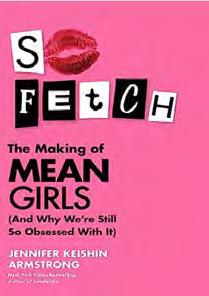


18 • Bay area reporter • March 7-13, 2024
t << Books & Online Events Let’s talk cannabis. CASTRO • MARINA • SOMA C10-0000523-LIC; C10-0000522-LIC; C10-0000515-LIC Going out We’re big fans of the terpsichorean arts, and not just modern dance and ballet, but hunky gogo guys as well, like the caliente papis at Que Rico in Oakland (see photo). You’ll find them all, plus theater, visual art and music, in our online listings, this week and every week in Going Out. Que Rico



‘You Only Call When You’re in Trouble’
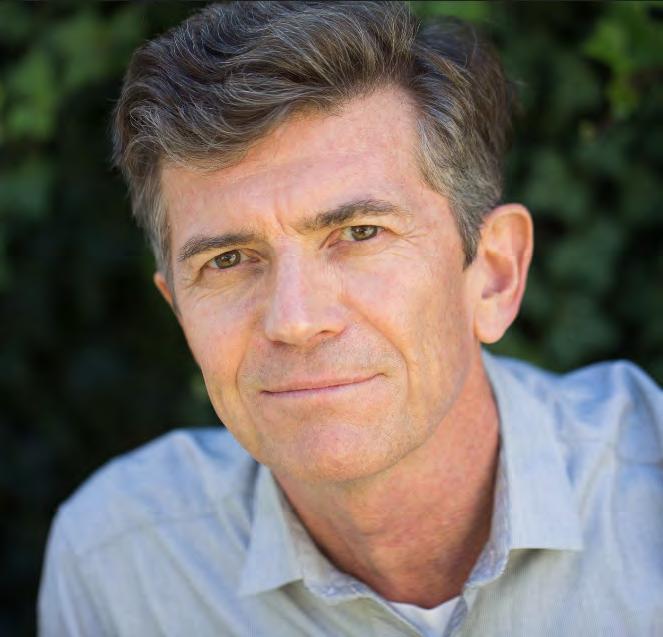 Author Stephen McCauley
by Brian Bromberger
Author Stephen McCauley
by Brian Bromberger
Stephen McCauley is a master of the comedy of manners genre, producing a novel usually every five years, since his first bestseller “The Object of My Affection” in 1987. McCauley’s eighth book, “You Only Call When You’re In Trouble,” follows this template again, but is not formulaic, with new shibboleths to slay.
The novel opens with hippie/free spirit, flighty Dorothy embarking on a risky venture, opening the expensive, over-budgeted Omega Institute, a retreat center in Woodstock, New York (yes, that Woodstock). Her business partner is bullyish, opportunistic self-help (“the politically acceptable cousin of religion”) guru Fiona Snow, whose book, “The Nature of Success in Successful Natures,” was briefly a bestseller after Oprah commented on it.
Dorothy neither plans ahead nor worries about the future. She asks her 30-something daughter Cecily to the gala opening in the hope of passing a legacy to her. After decades of lying, she’ll also disclose the long-hidden identity of Cecily’s father.
Dorothy has also summoned her 63-year-old brother Tom, a gay architect, who’s been her emotional and financial anchor and Cecily’s codependent surrogate father figure. He’s always put himself second to their needs.
Unhappily aging, Tom has reached the pinnacle of his career by designing a tiny-house masterpiece (“guesthouses for suburban couples with money and marital issues”) to his wealthy clients Charlotte Morley and Oliver Fuchs, both long-time friends of Dorothy. Charlotte wants to add a second story, opposed by Tom, but favored by his boss. “Part of an architect’s job was to praise the client’s brilliance, while showing them they were delusional.”
If Tom declines her request, he’ll be fired. To complicate life further, his long-term boyfriend Alan, tired of always playing second fiddle to Cecily, dumps him and moves out. Tom tries to win him back, despite his doubts about marriage. “Monogamy was as unsustainable and unhealthy as a raw food diet and, in the case of male couples, as cloying as matching sweaters.”
Life choices
Meanwhile, Cecily is facing a Title IX investigation at Deerpath College outside Chicago where she’s an American Studies professor. She’s accused of having a relationship with Lee, a student who forcibly kissed her, yet despite making those advances, Lee now accuses Cecily of sexual assault. She’s suspended from her job while the charges are investigated. Her boyfriend Santosh stands by her, but his prudish Indian mother threatens to banish him from the family if he stays with her. All three main characters are messes, deft at avoidance behavior. Will their lives collapse or come together?




2017 Media Kit 0 a


discounts”), hard-won insights, and laugh out loud aphorisms (“He was in a nail-biting race with the planet to see ing and bewitching novel will lift your mood, inspiring you to want to be a
inely be sad to see it end, realizing you will have to wait another five years to get your fix of McCauley’s delicious,
Mission Statement
lan, $27.99 www.us.macmillan.com
The Los Angeles Blade covers Los Angeles and California news, politics, opinion, arts and entertainment and features national and international coverage from the Blade’s award-winning reporting team. Be part of this exciting publication serving LGBT Los Angeles from the team behind the Washington Blade, the nation’s first LGBT newspaper. From the freeway to the Beltway we’ve got you covered.
“I’ve had a man and I’ve had a woman, and there’s got to be something better.”
—Tallulah Bankhead



t
Books >>
music dance theater
Performances Cal
Alvin Ailey American Dance Theater

Continuing a 55-year relationship with Cal Performances, the magnificent dancers of Alvin Ailey American Dance Theater return to campus for the company’s annual residency with an exuberant selection of recent works— including premieres by Elizabeth Roxas-Dobrish and Amy Hall Garner— and Ailey masterpieces that celebrates the Black American experience.
Jakub Józef Orliński,
countertenor
Il Pomo d'Oro Beyond
Riveting Polish countertenor Jakub Józef Orliński returns to Berkeley this season with the sensational ensemble Il Pomo d’Oro in a program of rarely performed works from the 16th and 17th centuries—by Monteverdi, Caccini, Frescobaldi, Cavalli, Strozzi, and others.
// 2023–24 Season
Danish String Quartet
Johannes Rostamo, cello
Apr
Mark Morris Dance Group
Mark Morris Dance Group visits with the profoundly moving repertory work Socrates danced to the music of Erik Satie, and the world premiere of a new Morris creation Via Dolorosa, set to Nico Muhly’s meditative composition The Street, and featuring harpist Parker Ramsay performing the score live.

Apr


Angélique Kidjo
Angélique Kidjo has cemented her status as one of the most adventurous and omnivorous artists on the international pop music scene. The fivetime Grammy winner is known for making connections across genres, generations, and geopolitical boundaries, enlisting her clarion voice and dynamic, eclectic musical vision to address complex subject matter through radiantly joyful music.
The dazzling Danish String Quartet returns to complete its ambitious multiyear Doppelgänger Project, which has paired major works from Schubert's chamber music repertoire and the newly commissioned quintet by renowned British composer Thomas Adès. The quartet is joined by Johannes Rostamo, principal cellist in the Royal Stockholm Philharmonic Orchestra, for Schubert's inventive String Quartet in C major.

An Evening with David Sedaris
Called “one of the greatest humorists writing today” by the Chicago Tribune and a “champion storyteller” by the Los Angeles Times, the Berkeley favorite visits with readings drawn from his beloved best-selling books and story collections, as well as new and unpublished work.
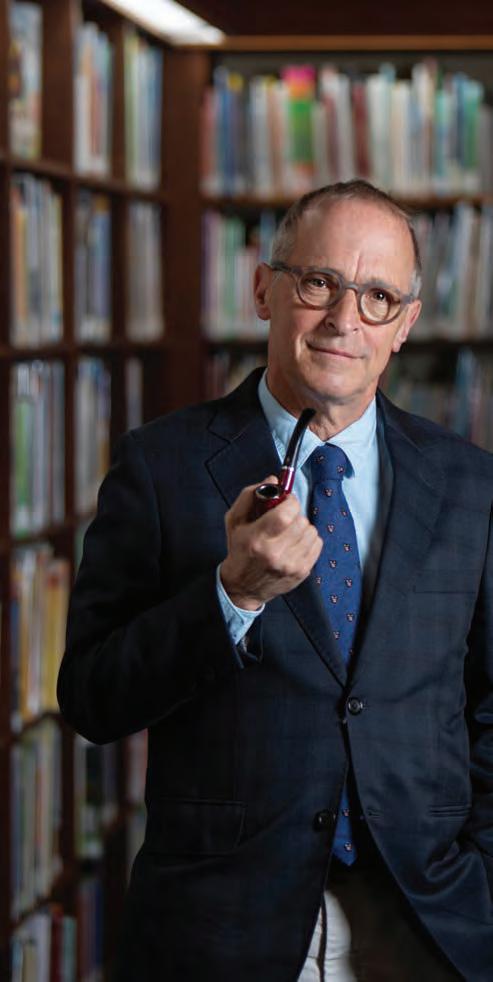
calperformances.org | 510.642.9988
ZELLERBACH HALL
2–7
19–21 ZELLERBACH HALL
9 ZELLERBACH HALL
26 ZELLERBACH HALL
13 ZELLERBACH HALL May 5 ZELLERBACH HALL
Apr
Apr
Apr
UNIVERSITY OF CALIFORNIA, BERKELEY

































































 by Jim Gladstone
by Jim Gladstone






 by Gregg Shapiro
by Gregg Shapiro




 by Victoria A. Brownworth
by Victoria A. Brownworth









 by Jim Provenzano
by Jim Provenzano





 by Jim Piechota
by Jim Piechota











 Author Stephen McCauley
by Brian Bromberger
Author Stephen McCauley
by Brian Bromberger













